Minnestar
- Let’s Invest: Building Strong Community and Empowering Our Future with Steve Buchanan
- Mastering LLM Optimization: RAG, Fine-Tuning, and Combined Strategies with Prashanth Pollishetty and Varun Kodathala
- Google Sheets + AI, the new Brainstorming, and Custom GPTs with Jeffrey Williams
- Retro-Computing Hobby with Girish Jorapurkar
- DevSecOps the Good, the Bad, the Ugly with Brian Dolan-Goecke
- There are a few of my son’s pieces mixed into the series titled “Little Man Specials.” This was a nod to those parents out there fighting to keep the creative spirit alive. He was captivated by the project and inspired to start plugging away on his own versions.
- I also had some heavy hitters that didn’t quite make the cut… Matt’s, CC Club, Electric Fetus. I can’t remember why exactly they weren’t included. I felt a sense of pressure to get the work out there and be one of the first Minneapolis inspired collections on-chain.
- While there was beauty in the limitations of the 612 pixels, there were also some challenges in getting the landmark at the right scale / perspective.
- 113 Al’s Breakfast (1 of 2) contributed from thingelstad.eth
- 015 Midtown Global Market (1 of 8)
- 099 Wells Fargo Center (1 of 8)
- 137 Grain Belt Sign (1 of 8)
- 244 Foshay Tower (1 of 8)
- 277 Goldy (1 of 8)
- 368 Capella Tower (1 of 8)
- 432 Riverside Plaza (1 of 8)
- 437 Gold Medal Building (1 of 8)
- 451 Target Headquarters (1 of 8)
- 493 IDS Tower (1 of 8)
- 609 Northrup Chair (1 of 8)
- 197 Campbell Mithun Tower (1 of 9)
- 294 Martin Olav Sabo Bridge (1 of 19)
- 538 Washington Avenue Bridge (1 of 23)
- 346 Basilica (1 of 24)
- 473 Lake Nokomis (1 of 24)
- 522 Bde Maka Ska (1 of 24)
- 564 Lake Hiawatha (1 of 24)
- 416 Minnehaha Falls (1 of 25)
- 111 35W Bridge (1 of 28)
- 207 Lake Harriet (1 of 28)
- 396 Lake of the Isles (1 of 28)
- 401 Hennepin Ave Bridge (1 of 28)
- 555 Cherry and Spoon (1 of 29)
- 118 Guthrie (1 of 32)
- 212 The Walker (1 of 32)
- 275 Stone Arch Bridge (1 of 32)
- 299 Lowry Ave Bridge (1 of 32)
- 349 Witches Tower (1 of 32)
- 509 Lowry Ave Bridge (1 of 32)
- 128 MIA (1 of 36)
- What is a POAP?
- Examples of POAPs and how they can be used.
- Review the Minnebar 17 POAP distribution.
- Discuss additional capabilities and applications built around POAP.
- We will even create a POAP in the event so you see how it is done.
- How do you find the things you put in the Weekly Thing?
- How do you create each issue?
- How do you maintain consistency?
- My task template that I use for each week
- The automation that I have created to build each issue
- The overall toolchain that I use to create it
- Specific tactics to maintain sustainability of a long-term project like this
- Easy to parse list of upcoming community events
- No more than three relevant links to news about the tech community
- Community Supporter Highlight, randomly share a bio about one of the community supporters each issue
- Project Highlights from Community Supporters to submit and share a project (personal, hobby, business) that they would like to highlight for everyone
-
Let’s do our very first ride on St. Patricks Day at 5:30pm with a 30-minute EDM ride with Jess King! 🎉 Join the class! 🗓 If that link doesn’t work please try another device or another time. It should open into the Peloton iOS app and allow you to sign up for the scheduled session. If it opens in a browser it will give you a beta feature message.
-
Tag yourself to join our community and add the MInnestar tag to your Peloton profile! 🏷
Minnebar 18
Today was one of the biggest days of the year for the technology community of the Twin Cities — Minnebar 18! Once again Best Buy Headquarters was a gracious host sponsor and Minnestar welcome over 1,000 passionate technolgies to partake in at least 80 sessions led by members of the community. Tyler and I had a great time and attended many sessions.
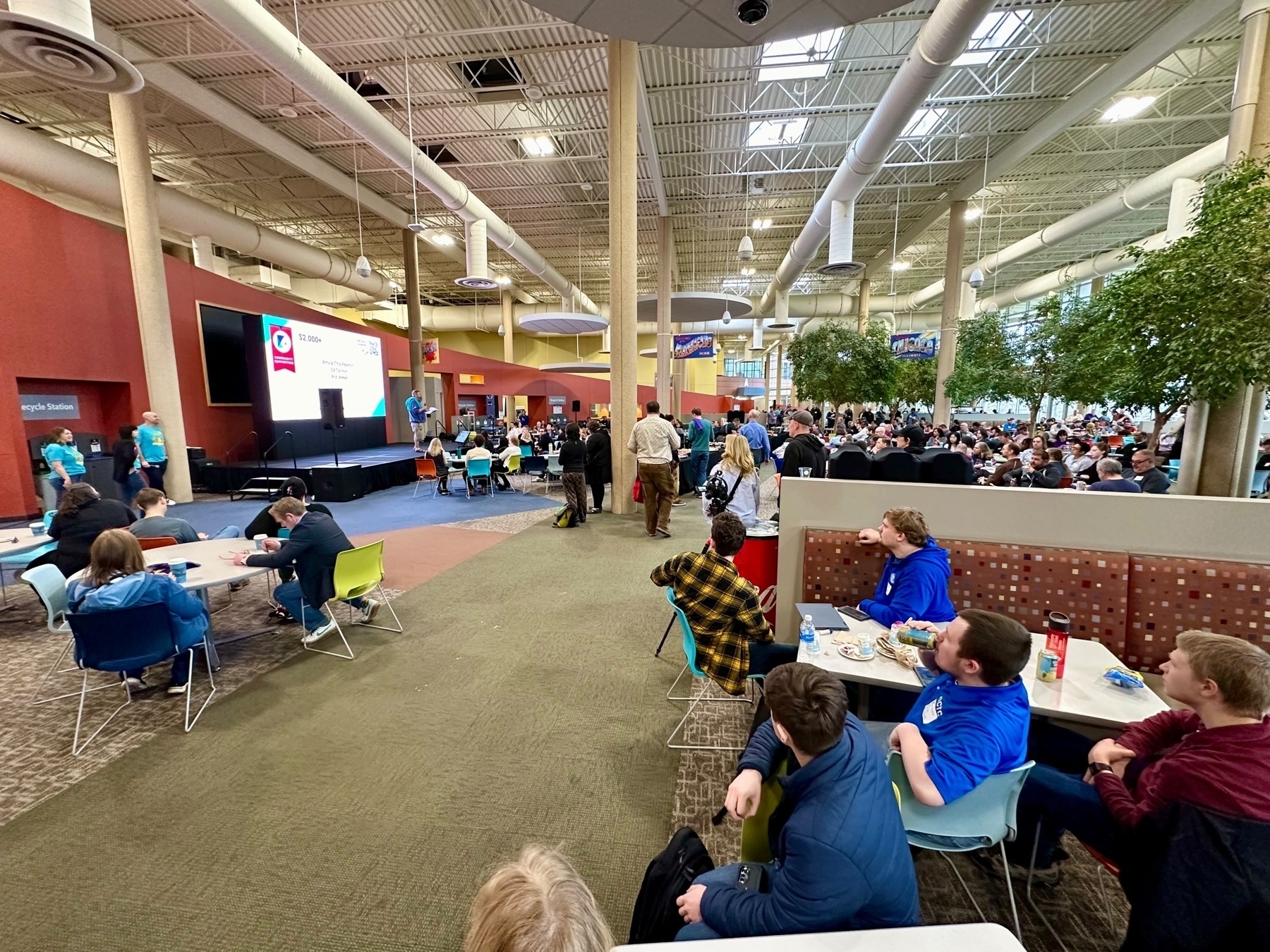
The main room as the day gets kicked off.
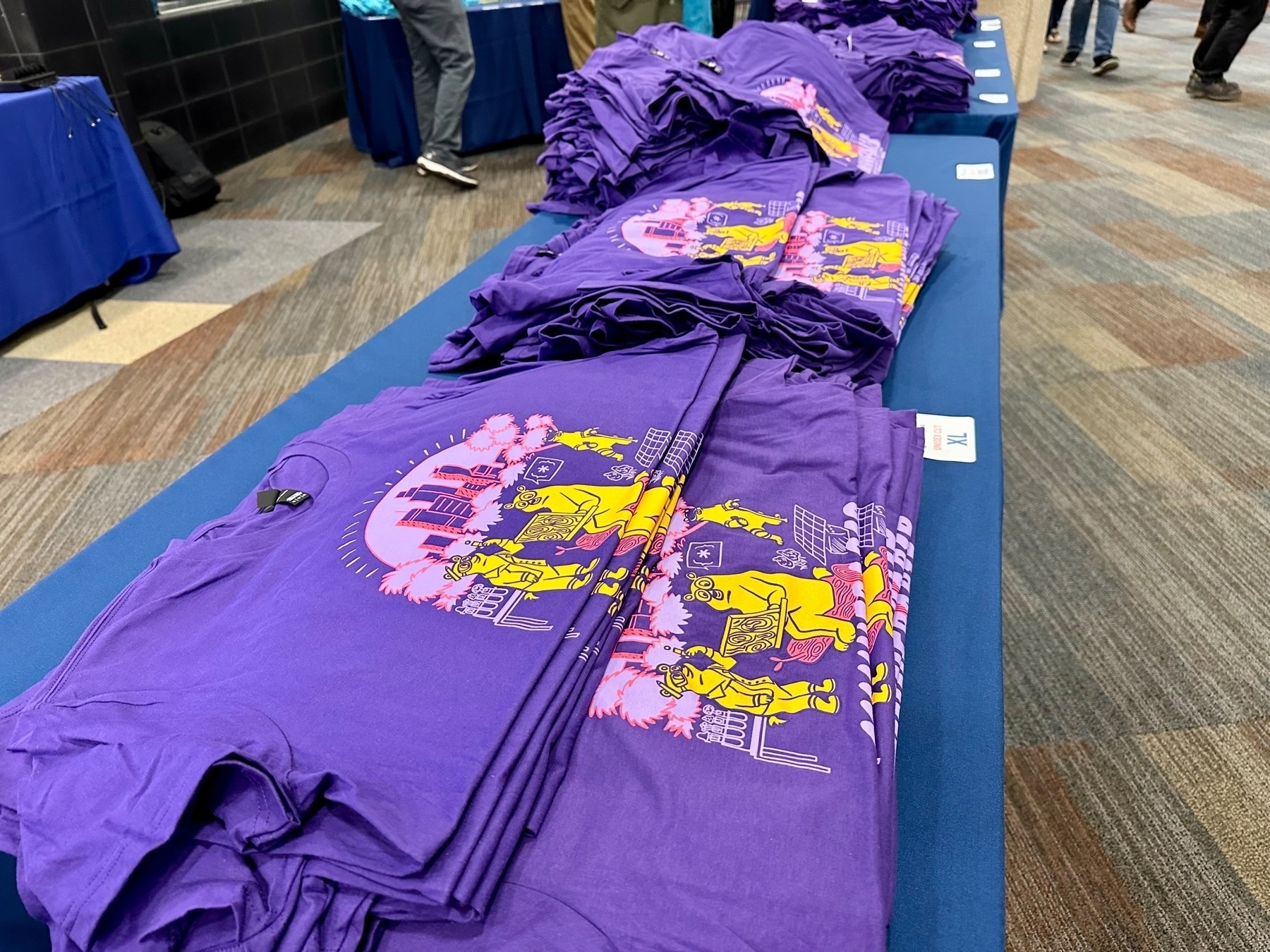
Minnebar 18 t-shirts ready! They look amazing!
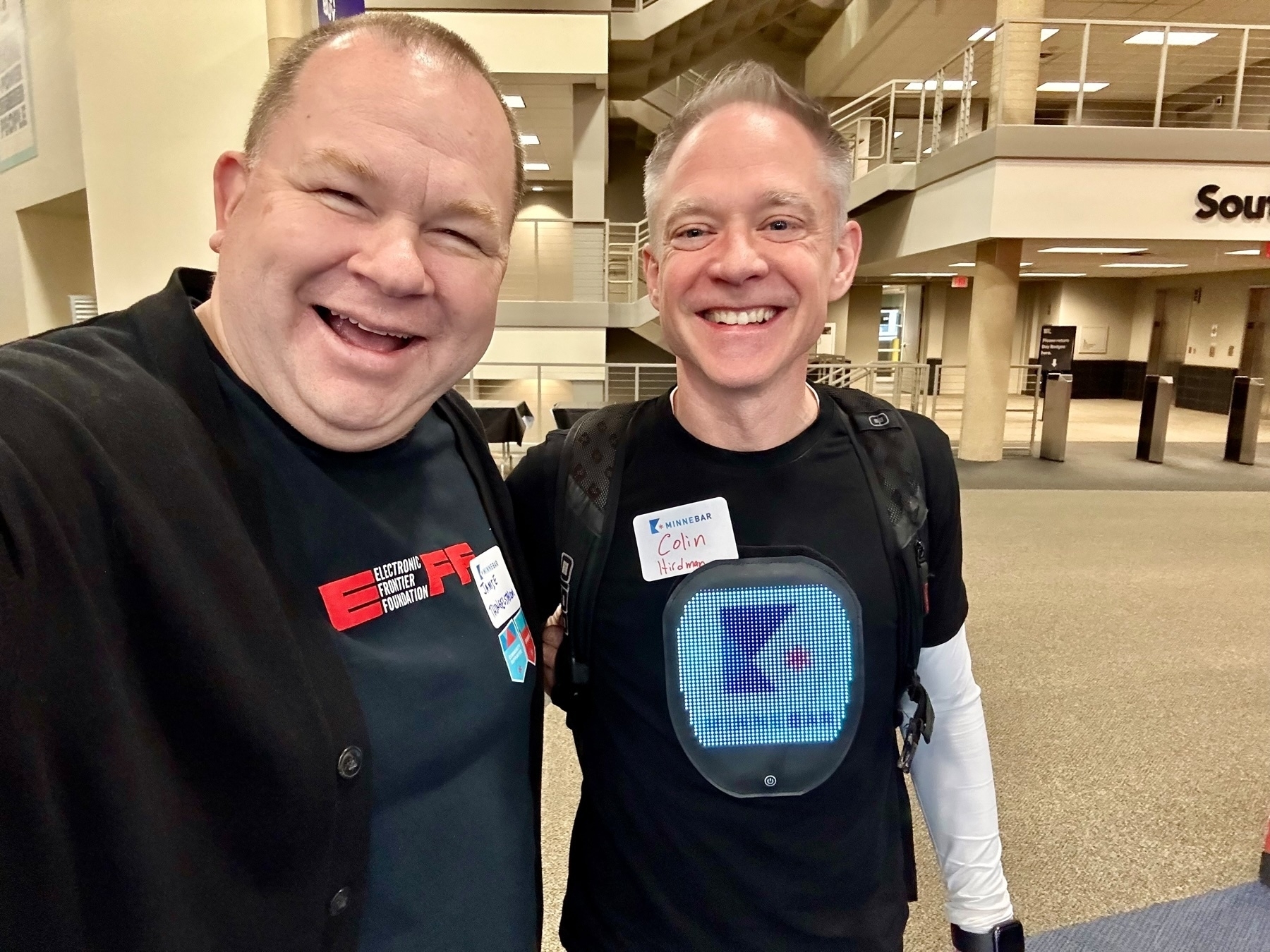
Ran into Colin Hirdman who had this incredible display integrated with his shirt.
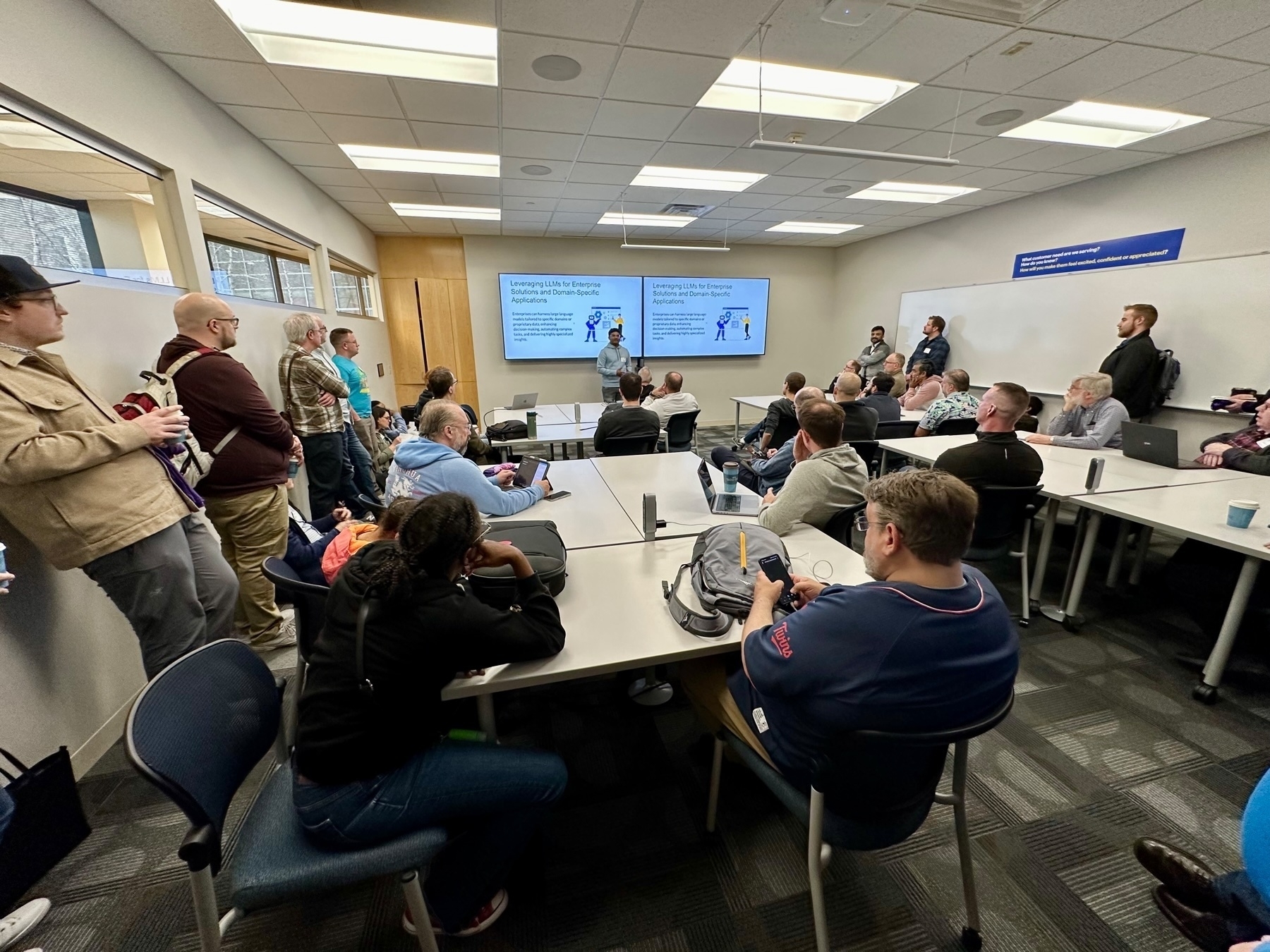
One of our sessions learning about LLM techniques.
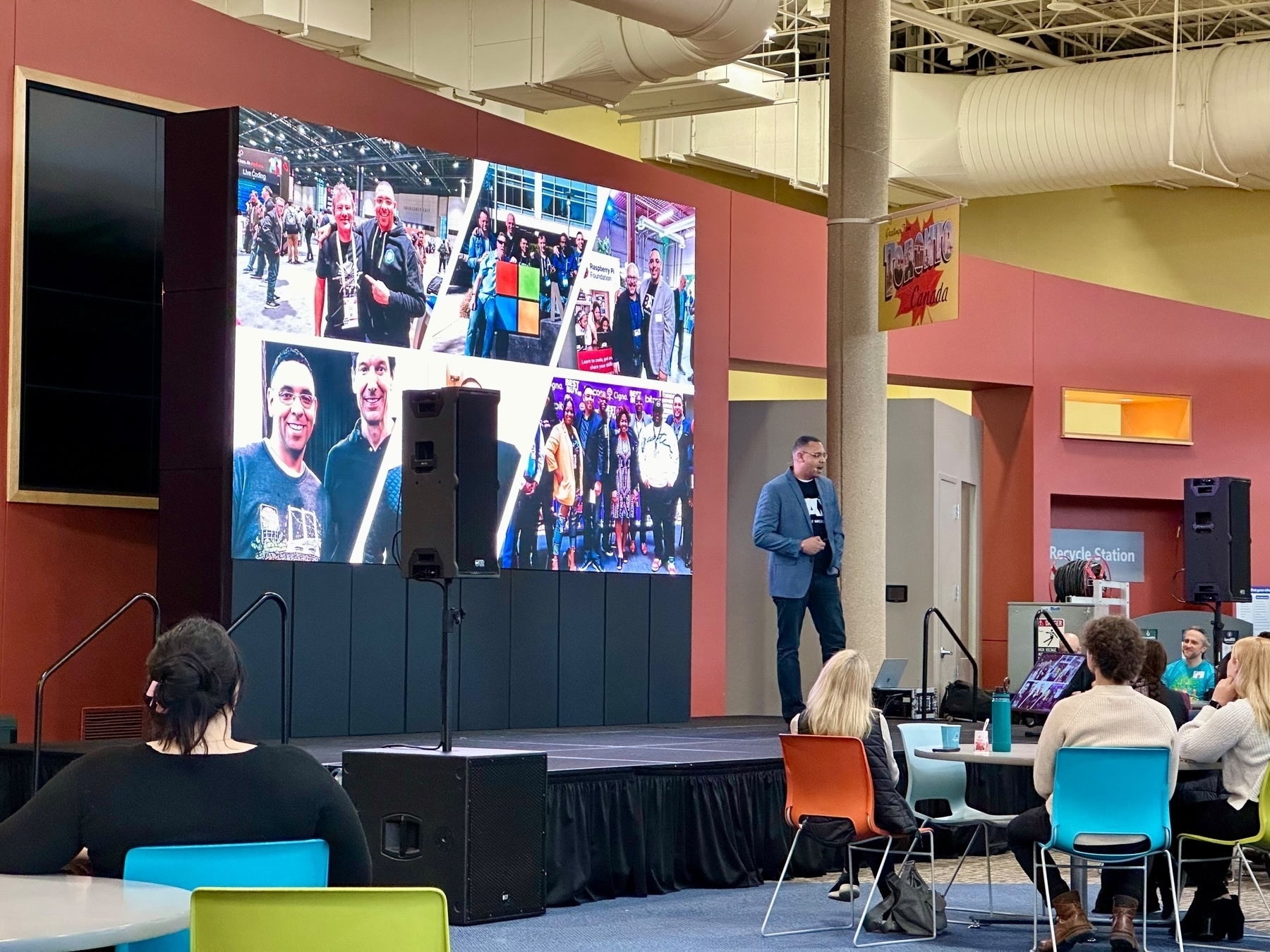
Steve Buchanan introducing himself as he gets Session 0 (aka Minnebar Keynote) going.
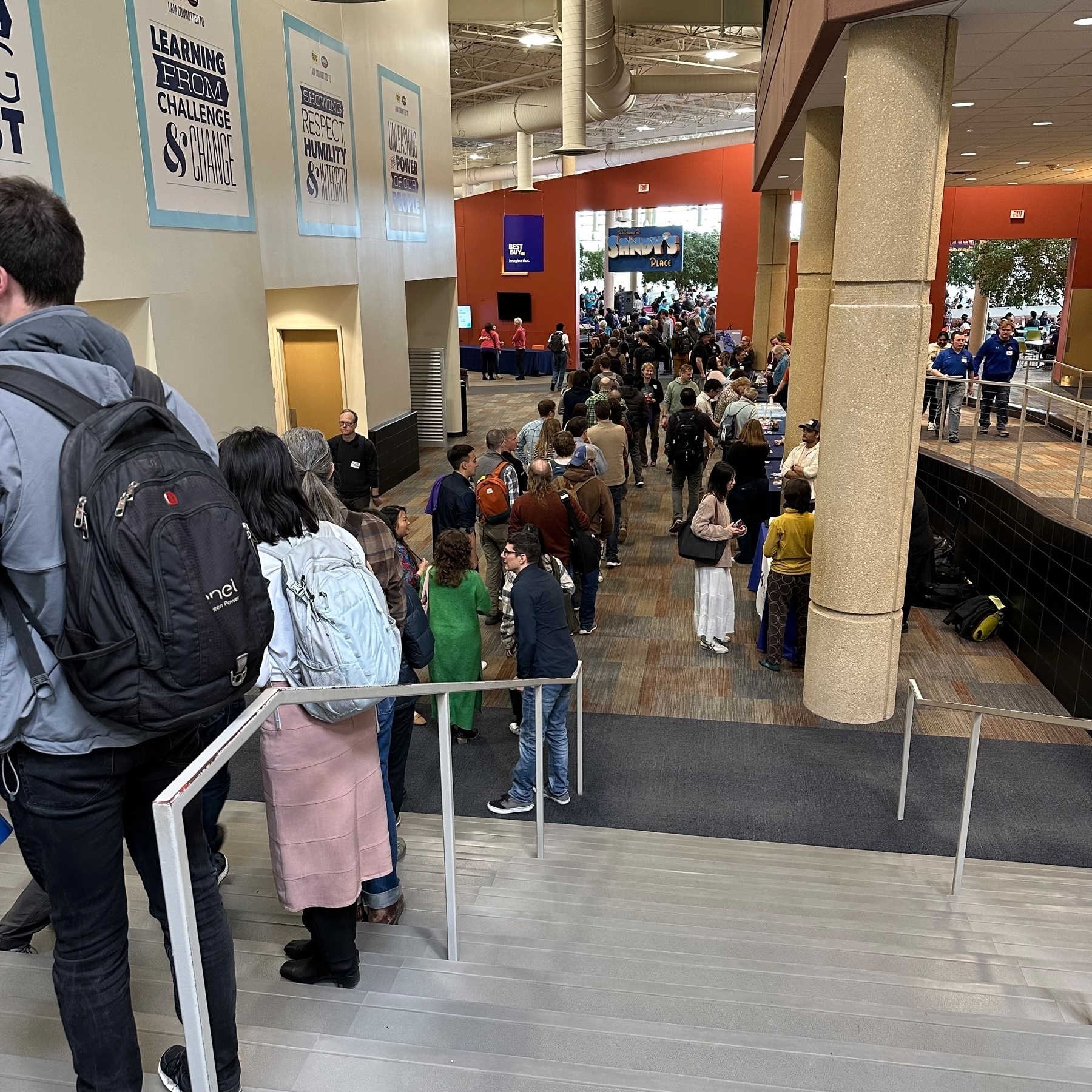
Very, very long line for pizza.
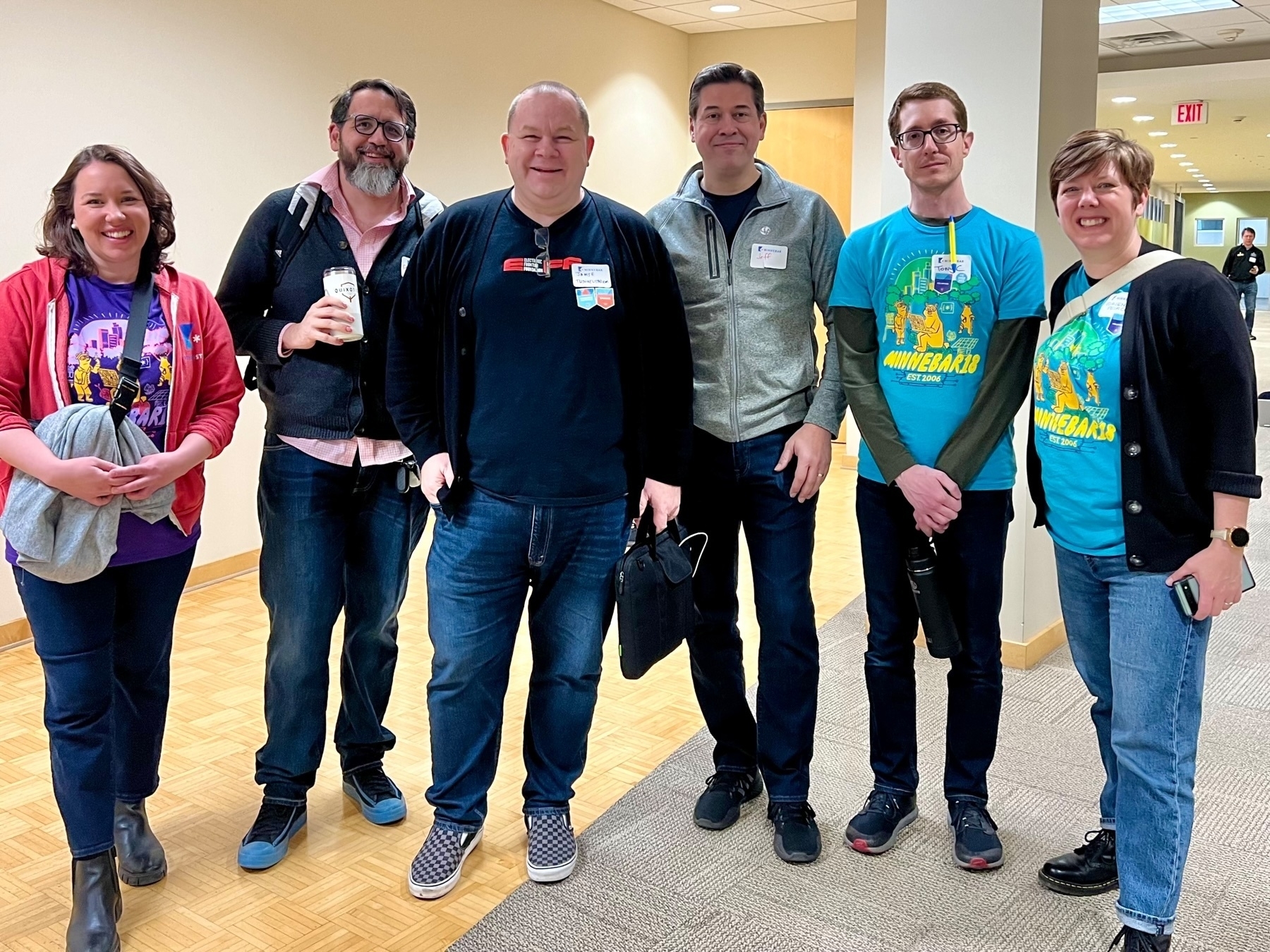
Great to see Maria Boland Ploessl, Benjamin Ortega, me, Jeff Sellner, Tony Collen, and Adrienne Peirce.
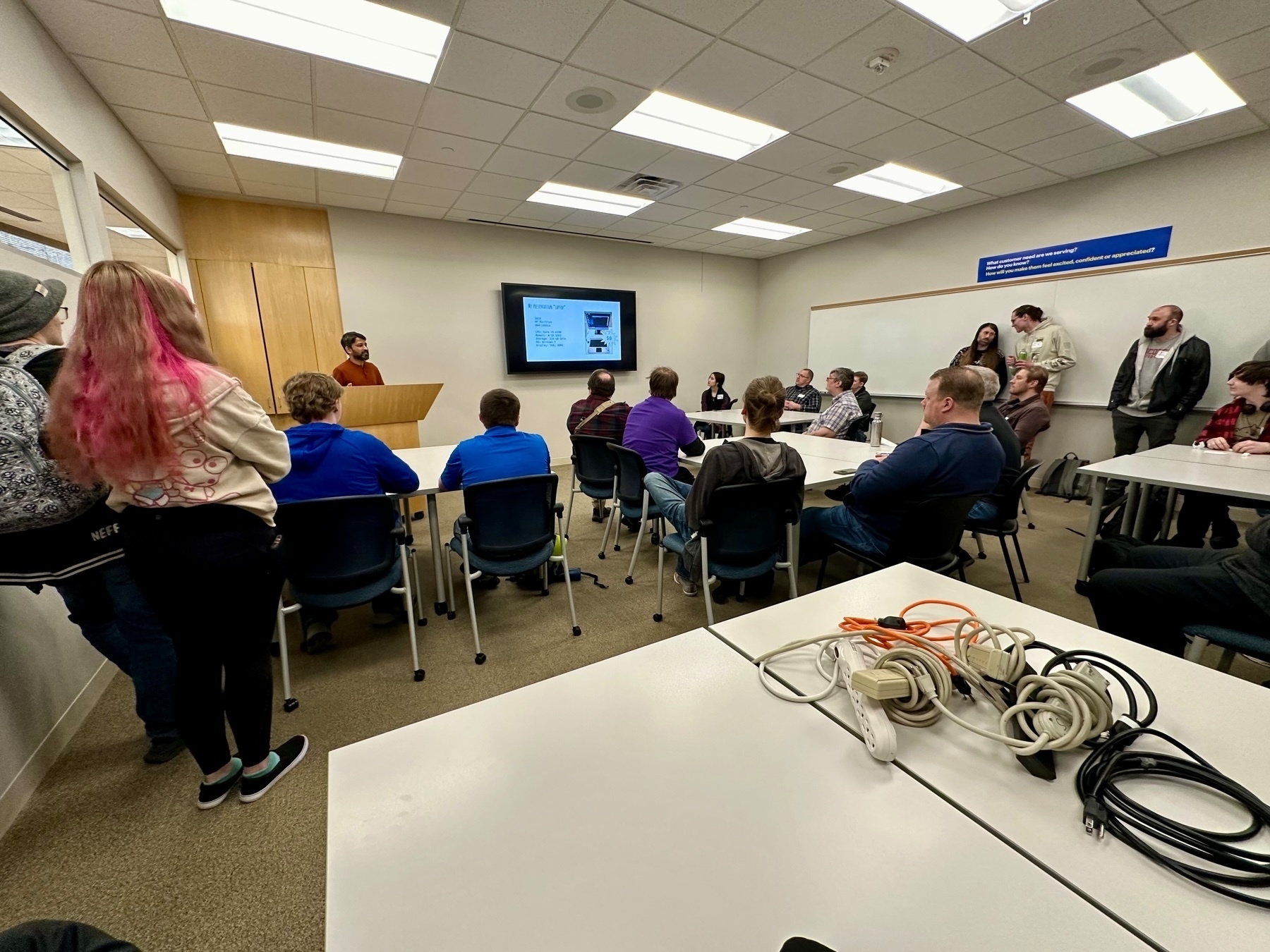
The session we attended Retro Hardware.
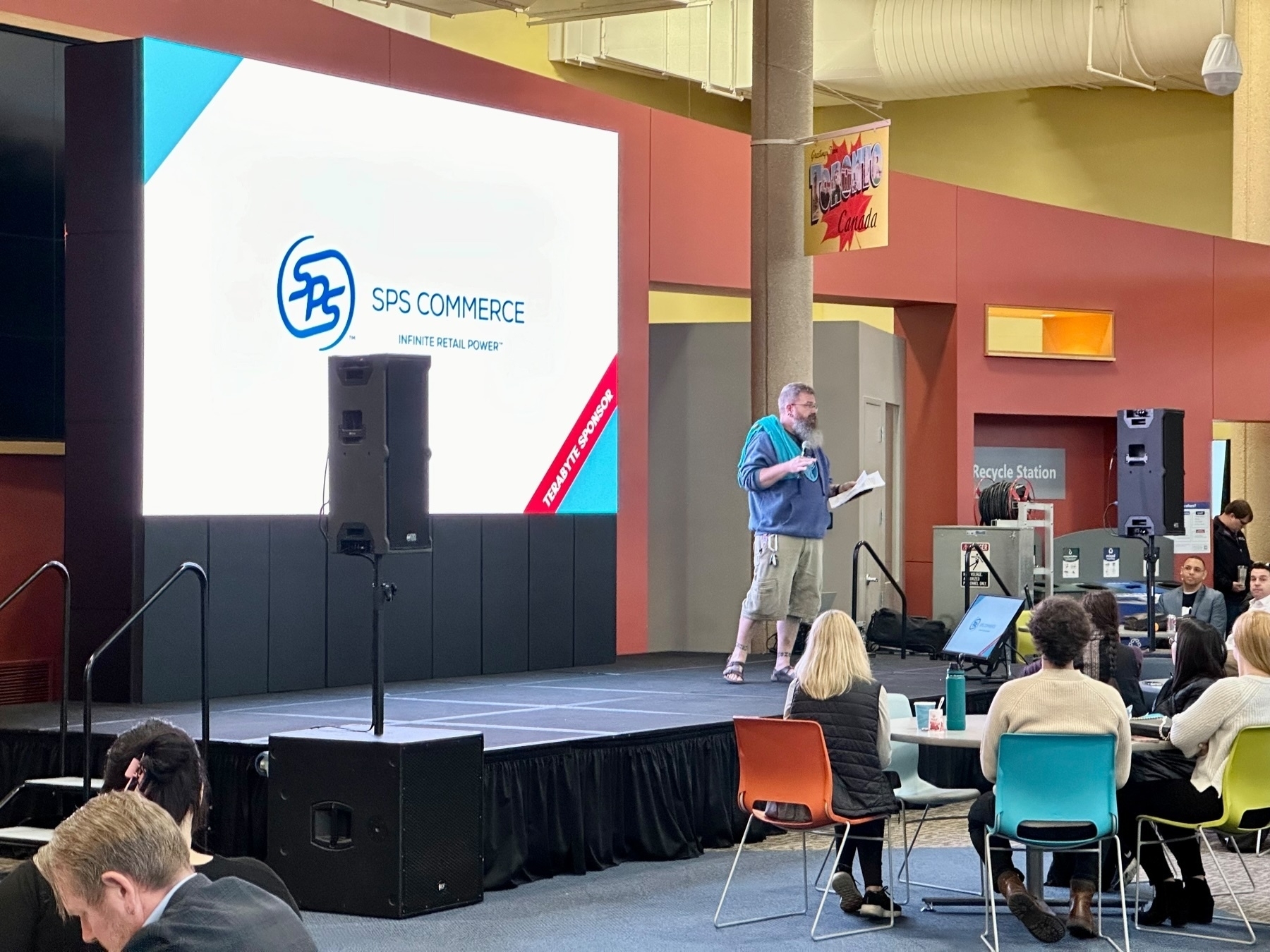
SPS Commerce is a terabyte sponsor of Minnestar!
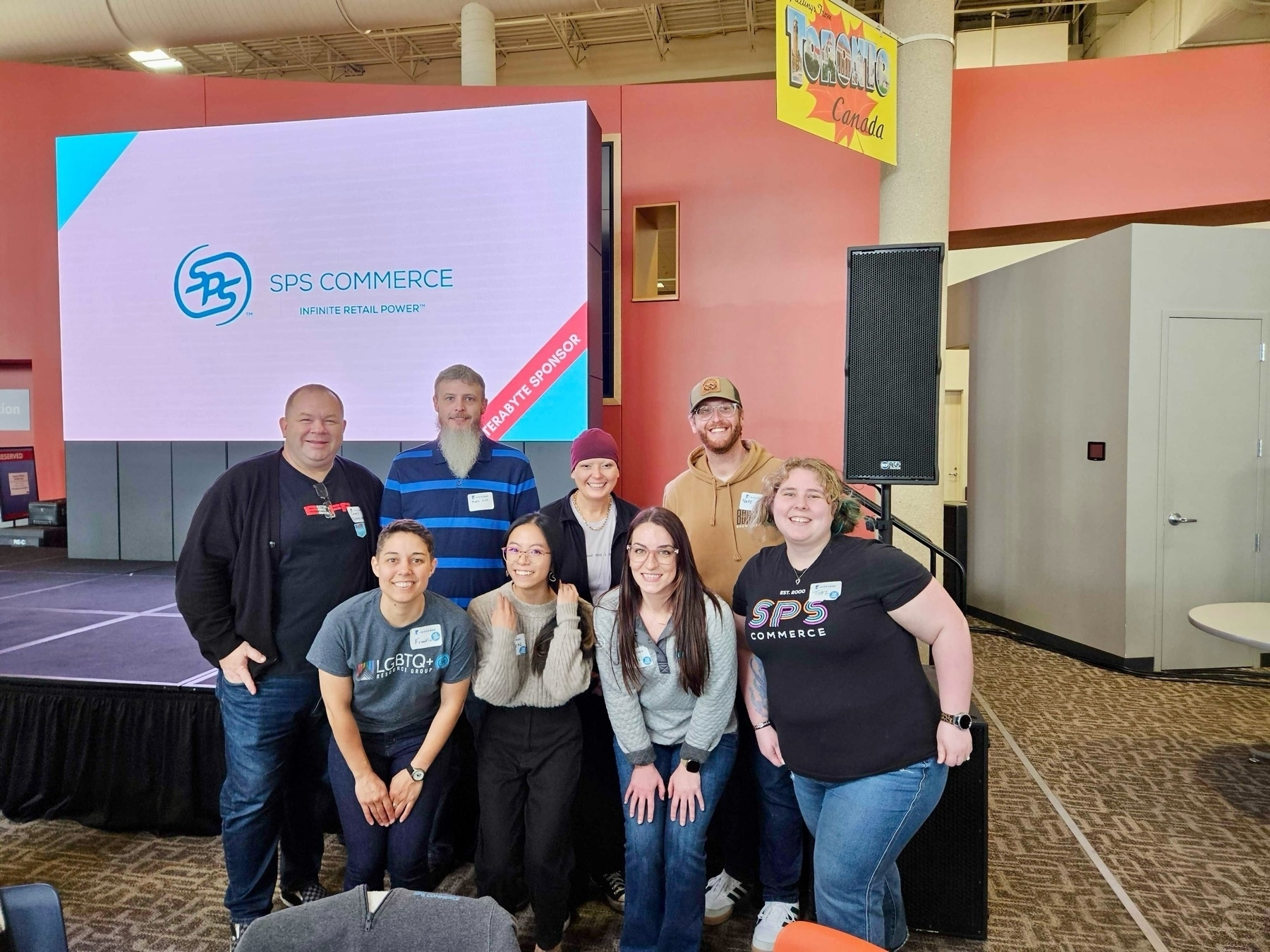
We didn’t get everyone, but several of #TeamSPS got together for a team photo at Minnebar 18!
👋 Awesome community members that I got to say Hi to at Minnebar (incomplete and unordered)…
Bridget Kromhout, Nate Anderson, Levi McCormick, Jeanette Dorazio, Justin Porter, Casey Helbling, Paul DeBettignies, John Roberts, Jenna Pederson, Colin Hirdman, Samantha Grumdahl, Matt Decuir, Gordon Raup, Maria Boland Ploessl, Adrienne Peirce, Jeff Sellner, Tony Collen, Benjamin Ortega, Corwin Diamond, Bode Falade, Mark Gritter, Nikki Riemersma, Jim Bernard, Pete Clark, Tor Flatebo, Tori Peraza, Melissa Buening, Jade Barker, David Duccini, Peter Edstrom, Graeme Thickins, Molly Doyle, Robert Weber, John Murphy, John Kelly, and Robert Speer.
See also Minnebar collection.
A warm welcome to the newest slate of Minnestar board members: Kathryn Frengs, Tim Herby, Muneeb B. Hafeez, Kevin Jansen, Robert Tomb, Matt Decuir, and Valerie Lockhart. I continue to be a big fan of Minnestar and their mission to catalyze the Twin Cities technology community.
Interview with 612 Series creator Erik Halaas
In October 2022 I found the 612 Series by Erik Halaas. This NFT collection resonated with me as a Minneapolis resident. I knew nearly all the landmarks and had fond memories of many of them. I decided to purchase five of them, which turned out to just be the start. I also shared the collection with others and even sent one as a gift. Eventually I acquired a complete set of the landmarks and got to know Erik, the creator of the 612 Series and StayNftyMpls. Erik even agreed to donate a collection for Minnestar to give away in a POAP drawing at Minnebar 17.

I had some questions about the 612 Series so I asked Erik if he would be up to do an interview to dive a little deeper. He was happy to, so here we go!
Q: What was your inspiration to create the 612 Series?
A close friend of mine extended a loose invitation to an art opening in NYC in the fall of 2021. Being cooped up in the midst of the pandemic, I was itching for an adventure and didn’t need much of an excuse to hit the road. I loosely heard of art “on-chain” and the growing energy around NFTs but knew nothing of the artist, Jeff Davis co-founder and Chief Creative Officer at Art Blocks, or the folks orchestrating the show, Bright Moments a DAO curating, promoting, and producing unforgettable physical showcases centered on creating art live, on-chain, in real life.
NYC would be the 2nd stop on their 10 city journey around the world, an effort to build a thriving community of “CryptoCitizens.” At face value, it was a growing collection of simple and silly pixelated characters but there was something more there. Folks were having powerful shared experiences in person (this meant a lot in 2021), being exposed to seasoned and often unsung artists, and learning together by exploring uncharted territory (e.g. crypto, NFTs, generative art).
Long story short, I left NYC with a strong desire to replicate this energy back home — to dust off my long-dormant creativity quelled by kids and full-time work; to build community with fellow creatives, curators, and collectors; to explore this new world of digital art, NFTs, and the value of content on-chain; but to do it in a way that was specific to my home, Minneapolis. As we waited for the plane, we were talking about the immense pride folks have in the city of Minneapolis and how we might capture it. We joked about “the 612” and something clicked…
What if I made 612 Minneapolis characters? Unique snapshots? Landmarks? What if we leaned into the pixelated energy of the era and confined the creation of each landmark to only being 612 pixels?!
The project was born from there.
Q: How did you pick the landmarks to include? Do you have a favorite?
The first was the Witches Tower — a favorite landmark from my childhood growing up in Prospect Park and one of the most beloved block prints I created years ago. I had played around with a pixelated version of the tower before the NYC happenings. With all that in mind, it is probably one of my favorite 612 Series landmarks.
From the Tower, the landmarks were essentially pulled from personal or shared Minneapolis memories. The city skyline, favorite parks or lakes, iconic bridges, memorable events, concerts, or shows. Whether historic Minneapolis landmarks or simply places I had visited and revisited with family and friends at various points throughout my life, these were all places etched in my memory as representative of home. I thought about crowdsourcing folks for key landmarks but the following for the project just wasn’t there.
A couple of fun notes…
Either way… there are definitely some could’a, should’a, would’a landmarks out there.
612 Series Landmarks: Minneapolis Institute of Art, Guthrie Theatre, Lowry Ave Bridge, Stone Arch Bridge, The Walker, Witches Tower, Cherry and Spoon, I-35W Bridge, Hennepin Ave Bridge, Lake Harriet, Lake of the Isles, Minnehaha Falls, Basilica of Saint Mary, Bde Maka Ska, Lake Hiawatha, Lake Nokomis, Washington Avenue Bridge, Martin Olav Sabo Bridge, Campbell Mithun Tower, First Ave, Capella Tower, Foshay Tower, Gold Medal Building, Goldy Gopher, Grain Belt Sign, IDS Tower, Midtown Global Market, Northrup Chair, Riverside Plaza, Target Headquarters, Wells Fargo Center, Al’s Breakfast, and The Kid’s House from Purple Rain.
Q: What software and tools did you use to create the series?
Funny enough, the work was all created in Excel. As someone who has traditionally worked with relief block printing as a creative outlet the switch to digital was a stretch and, thanks to work, Excel offered a familiar toolkit. I had also heard of other artists using excel for their work — be it code-based generative art or simply documenting cross-stitch patterns.
I decided to put the project on the Ethereum blockchain because it was something I was familiar with given Bright Moments and ArtBlocks use, and OpenSea, which operates on Ethereum, was growing in popularity at the time, offered a no-code entryway to the market, and supported “lazy minting” which allowed me to put the collection up at no cost by deferring the gas fees associated with minting the piece to the buyer (“minting” is the process of officially writing the piece onto the blockchain).
Q: What plans or ideas do you have to bring the 612 Series beyond pixels? You’ve done some paintings?
I worked with a group of folks a little over a year ago to explore the interplay between digital and physical work. We hosted a dozen local creatives, half of which had a presence on-chain and the other half with no experience with NFTs, crypto, web3, whatsoever. The end result was a curated experience weaving traditional 2D and 3D mediums in with a variety of tech forward, digitally inspired content at the Hewing Hotel gallery. You can learn about the artists and get a flashback via this collection of Instagram Stories. It was a blast!
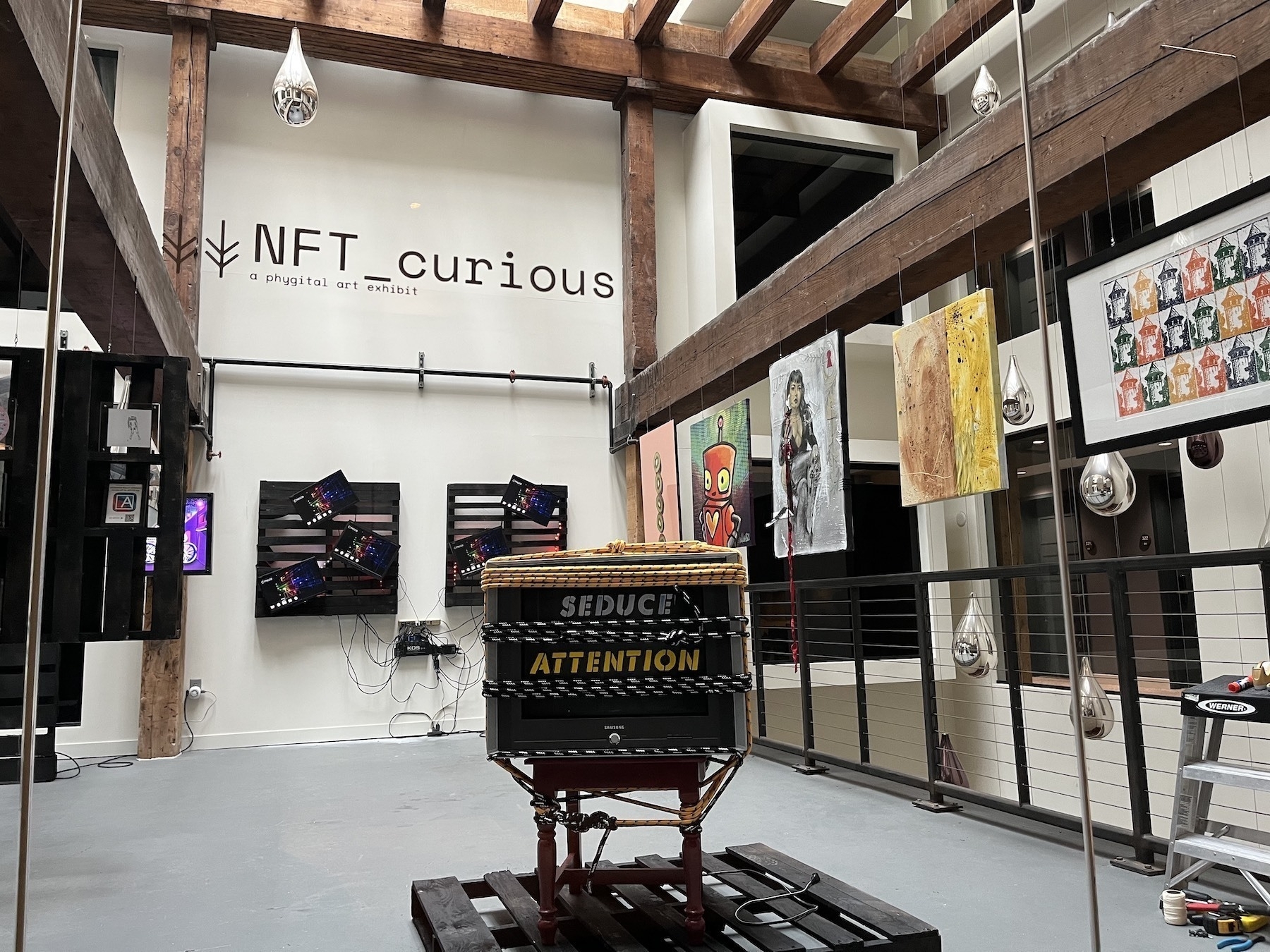
To highlight the 612 Series, I shared the initial relief block print of the Witches Tower that inspired the imagery for the series alongside an Infinite Object frame displaying a variety of the 612 Series Witches Tower NFTs. The show actually motivated me to revisit the original block printing method but reimagine the landmark in its pixelated form. I have gone on to create a few more of the landmarks in both the original and pixelated block print form (including one for you!) and would love to continue exploring how the pieces can be reimagined in the physical.
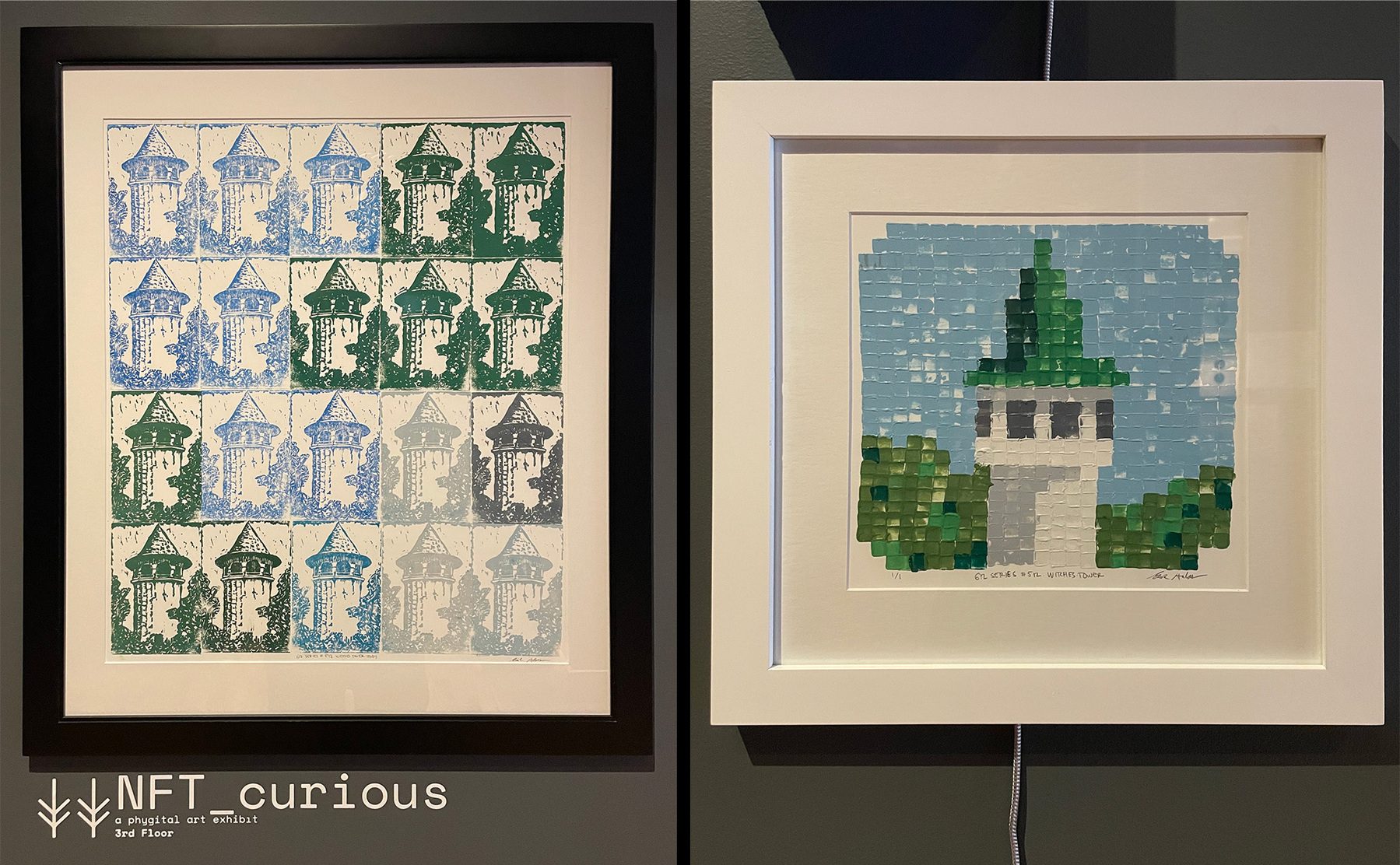
Q: If you fast forward a decade how would you like the 612 Series to be thought of?
I took great pride in being the first Minneapolis-centric NFT collection. Part of the importance of that to me was experimenting with blockchain technology and the capacity to track the work over time. Putting the pieces on chain memorialized this moment of creative inspiration and will allow me to track how interest and engagement with the collection grows, changes hands, ebbs and flows, is valued, etc. I know, for example, the exact moment that first piece moved and will know if, when, and loosely to whom that piece is handed off to down the line.
I would love to see this added narrative behind the original work build beyond simply documenting transactions — perhaps a way for holders to document and share the stories, memories, experiences that connected them to each of the landmarks they own. There was some of that starting to take place on social media.
Ultimately, these softer social interactions were the real impetus behind the project: to build community and spark creativity. This has been realized through “in real life” experiences like the show at the Hewing Hotel, collaborations with you at Minnebar 2023, connections with MN Blockchain, and so on.
My hope is that the project will continue to inspire local folks with a shared interest in the arts, technology, and community to connect, collaborate, and create locally!
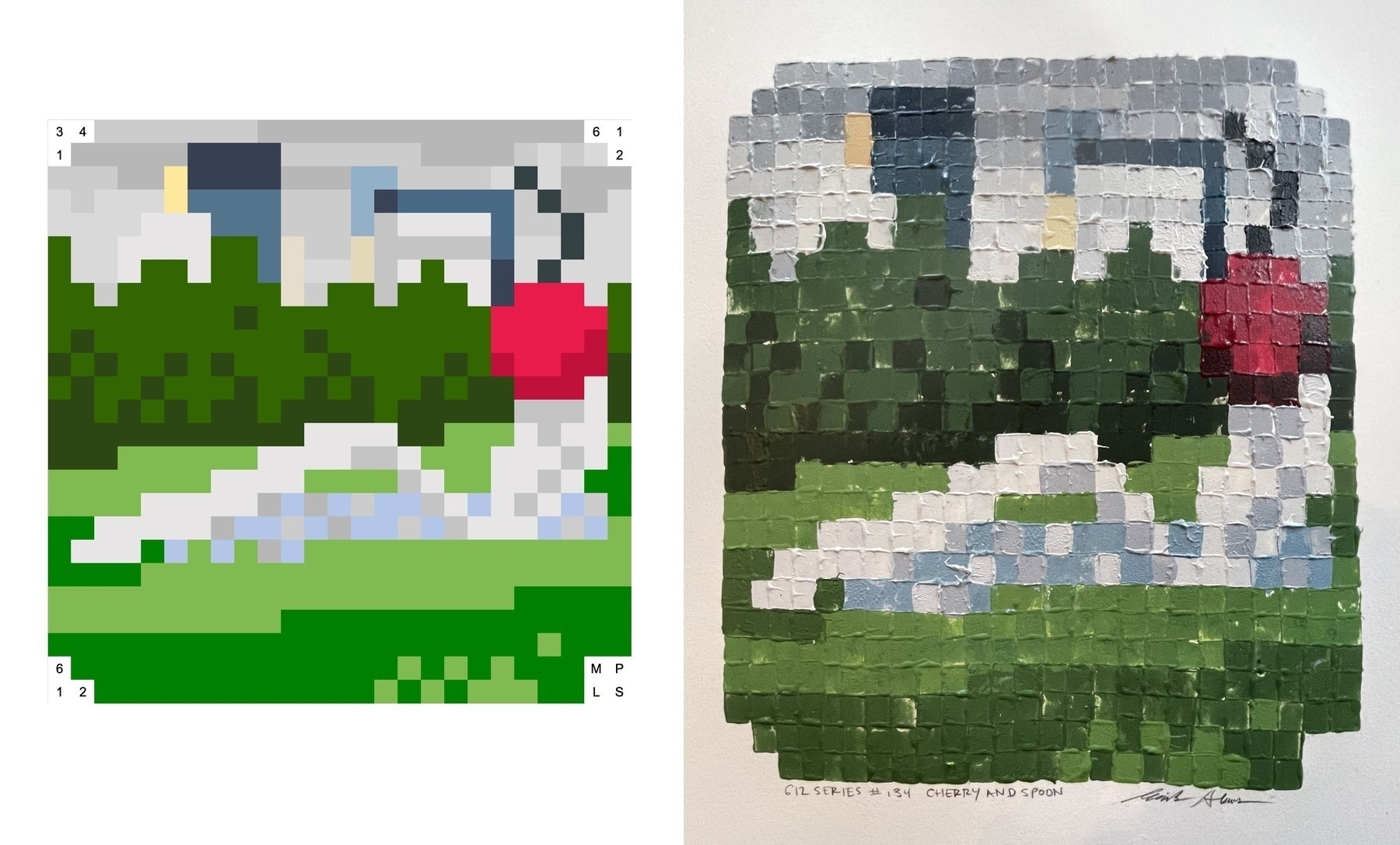
A big thank you to Erik for creating this series and for sharing more about it. I wonder if we will ever see a 2nd collection of the 612 Series with a new set of landmarks? Or maybe some ability to work with Erik and create a special 1 of 1 for a set of unique landmarks in the 612 Series. How cool would it be in fifty years to see bronze plaques setup at the various landmarks highlighting these early NFTs that commemorate that spot.
Want to own a piece of this collection? There are still many 612 Series collectibles available to buy! 🛍️
To connect with Erik you can find @ErikHalaas on X, his LinkedIn profile, or via StayNftyMpls.
I dig the simple and distinct look of the new Minnesota state flag. Certainly a more modern look.
Several years ago when I was still on the board of Minnestar we created a new branding system that looks almost like a precursor to the new flag.

Minnedemo 39 was awesome! It was great to see so many from our fabulous technology community, and to see the great demos that everyone shared.
Thanks to Caedence, Showcrow, Evergreen, Charles Edge, Request Metrics, and Raise a Hood for presenting!
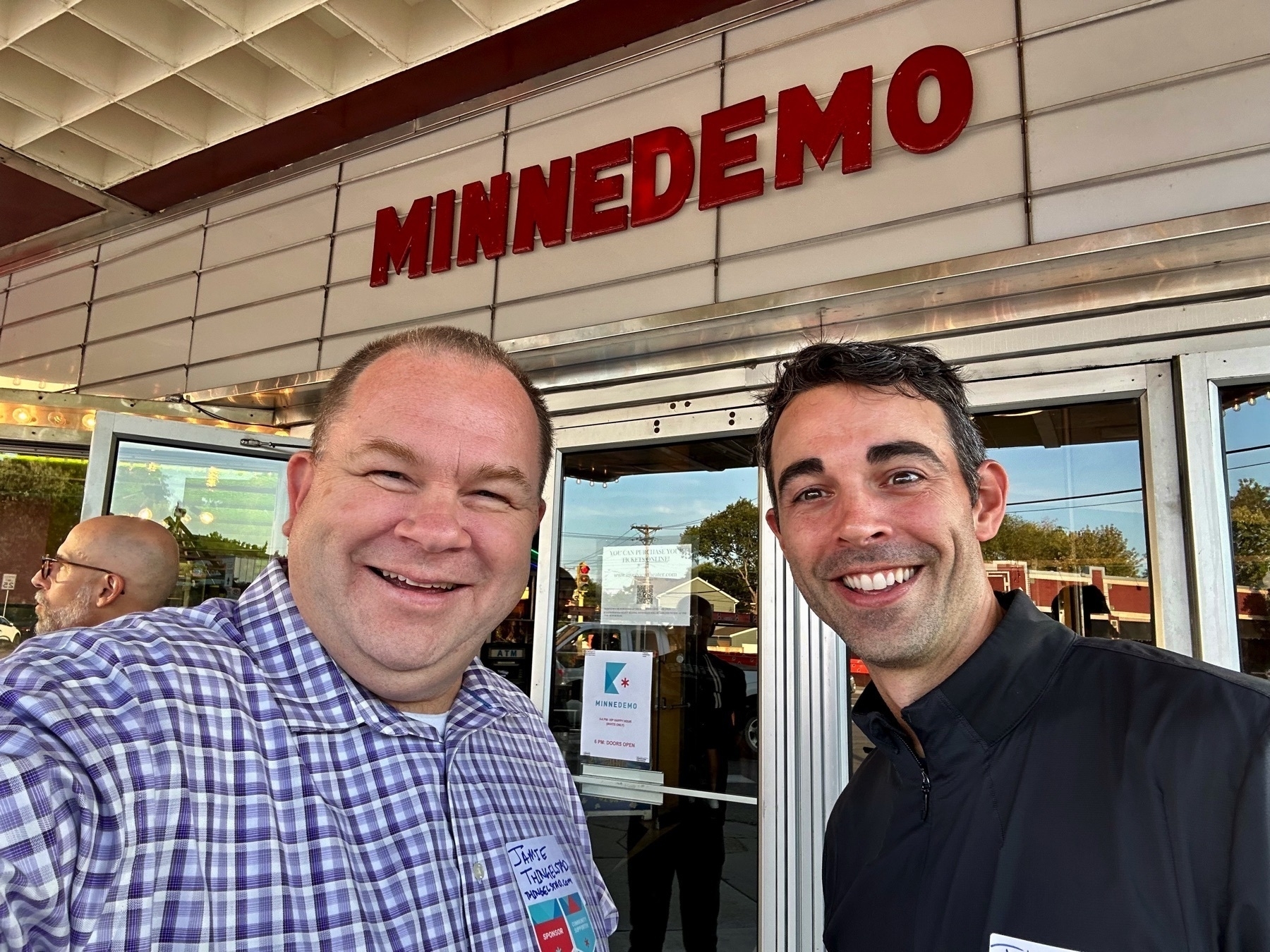
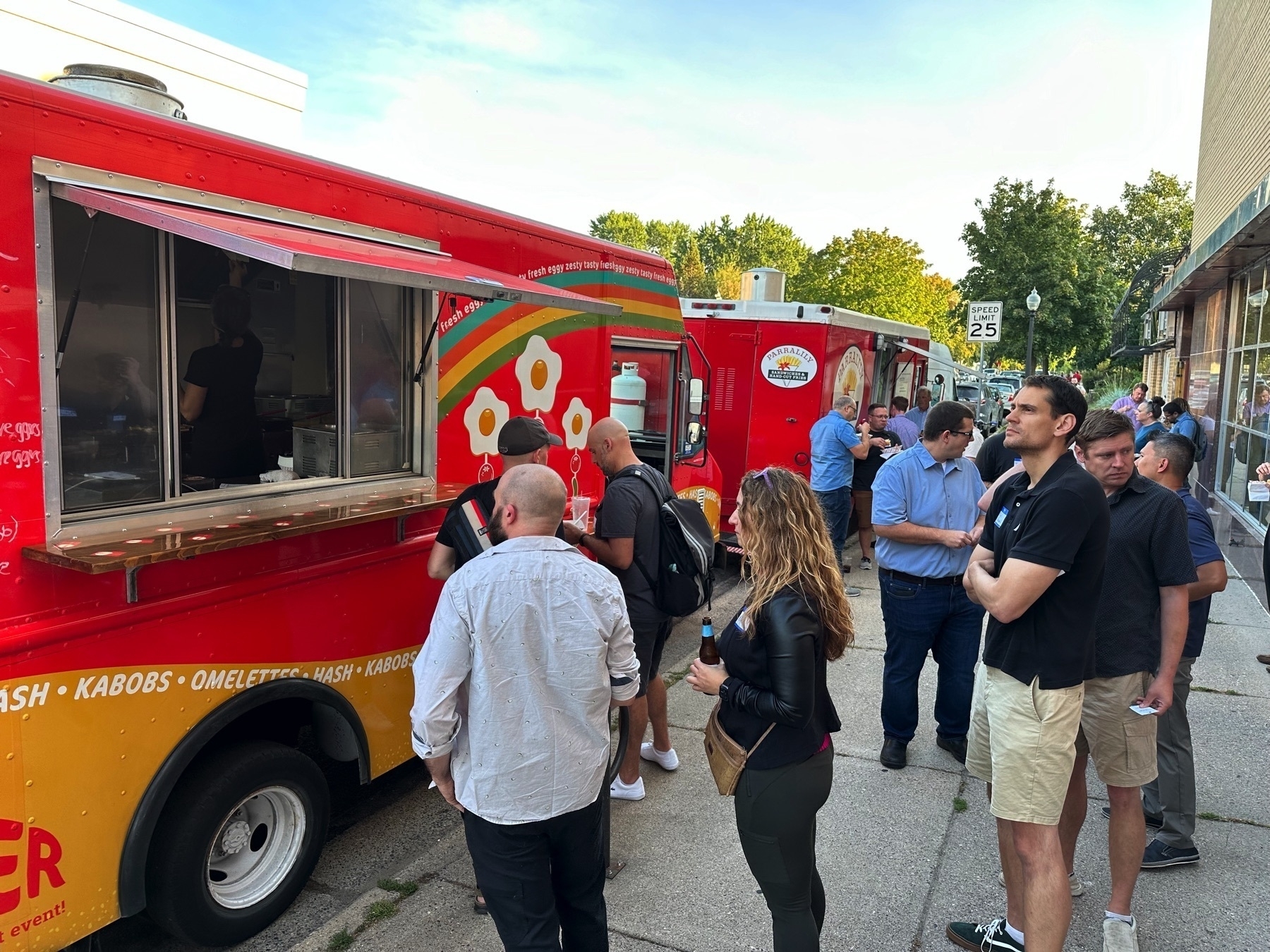
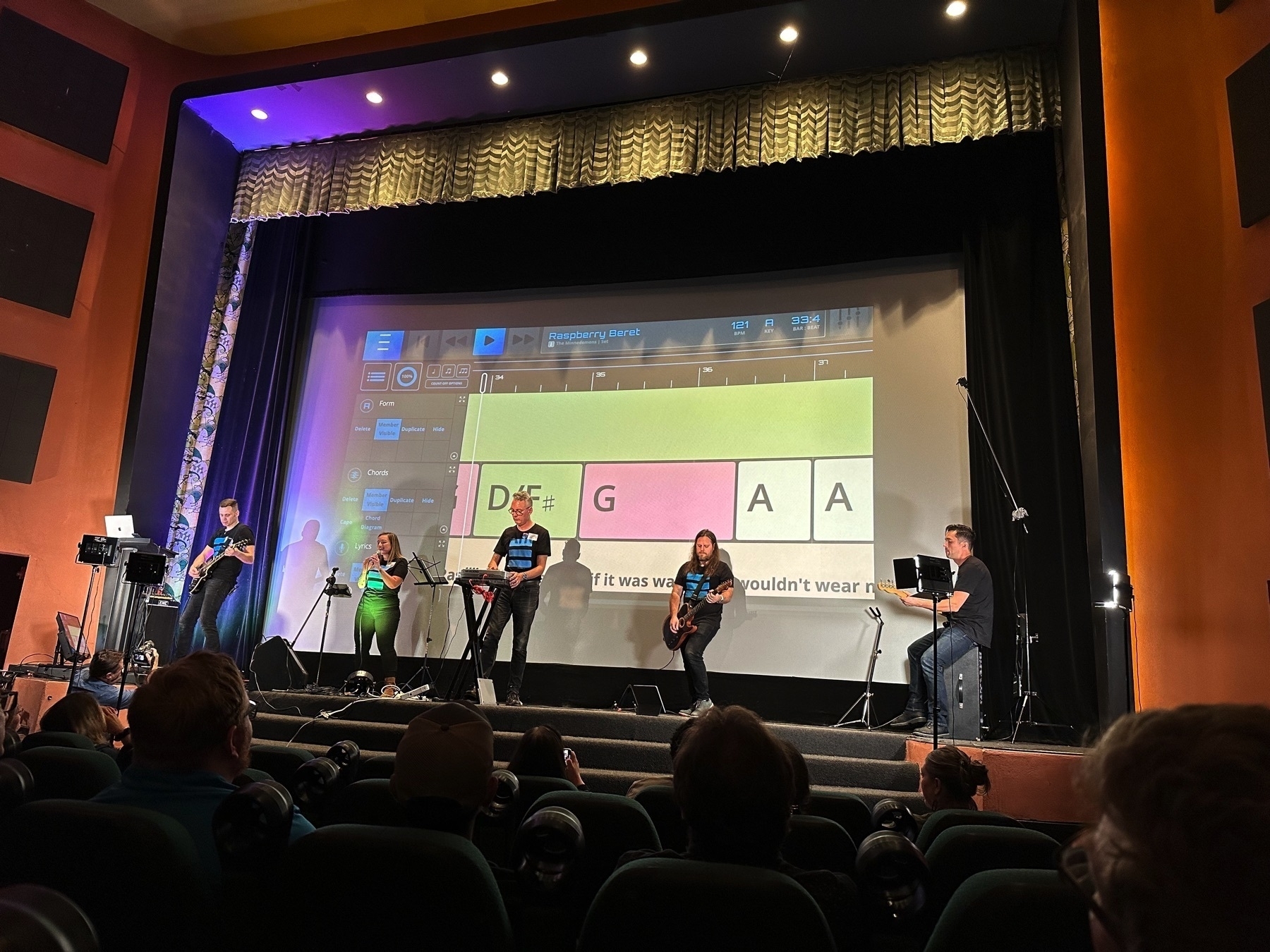
Farmhilly 8
My friend, and fellow Minnestar Catalyzer, Adrienne Peirce has this amazing house that sits on eight acres of land, and they host an annual event with bands playing all day, fun things for kids, yard games, food, and chill vibes to hang out in all day long. In all the years they have been hosting Farmhilly, we’ve never been able to attend, until this year. We finally got to attned Farmhilly 8 and had a nice chill afternoon with music, great weather, and the longest game of cornhole ever (the boys prevailed 21-20!).
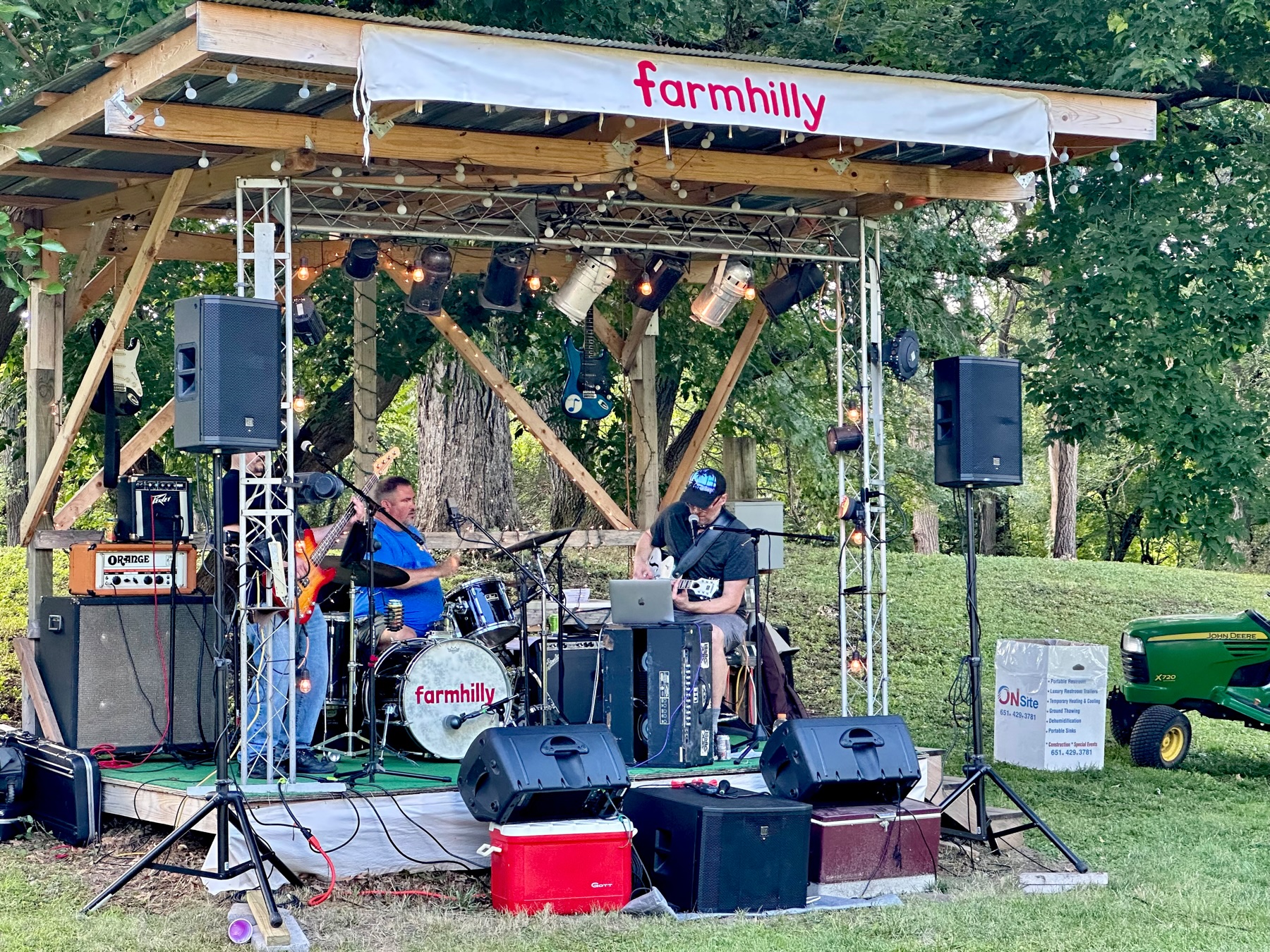
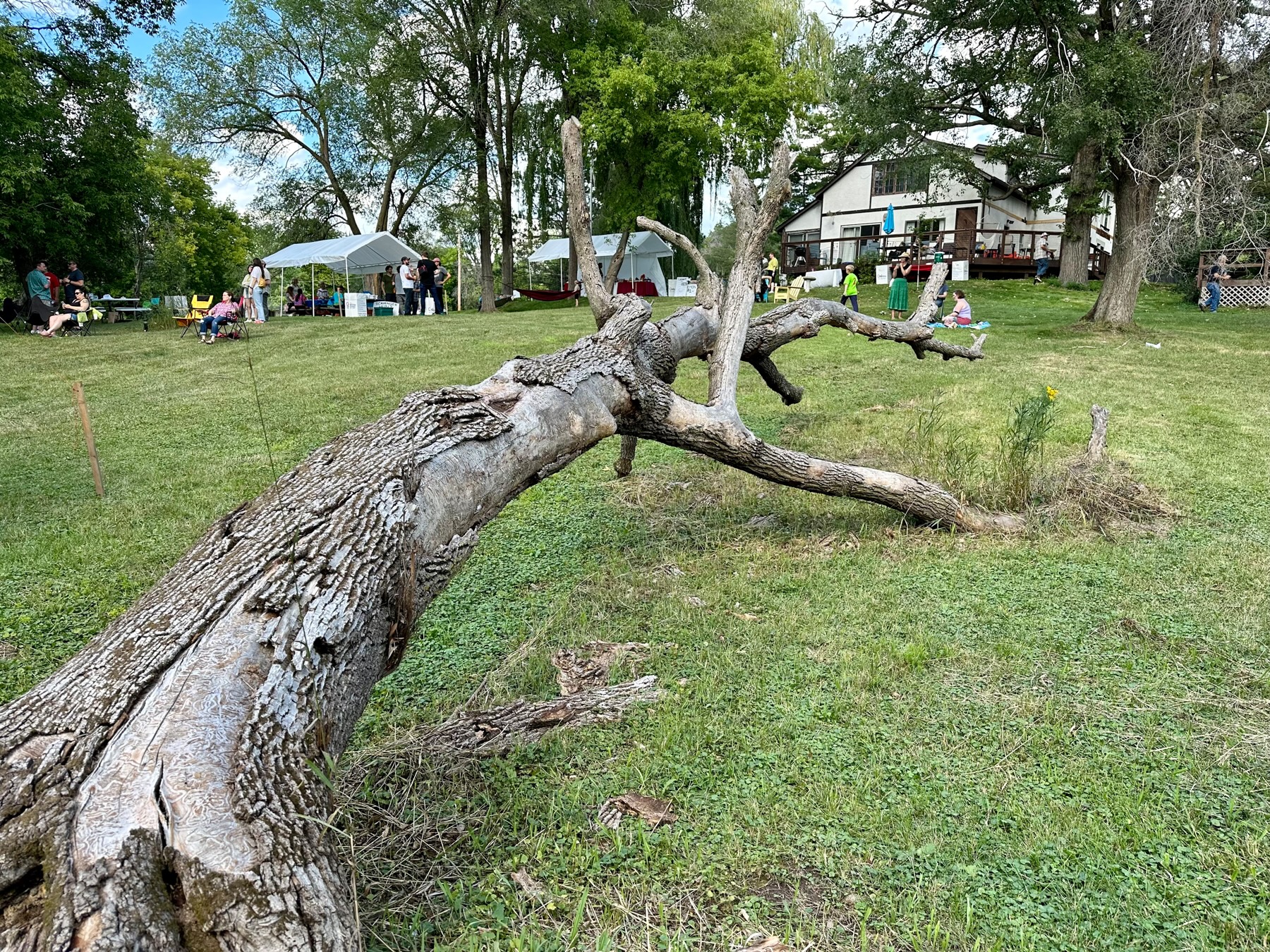
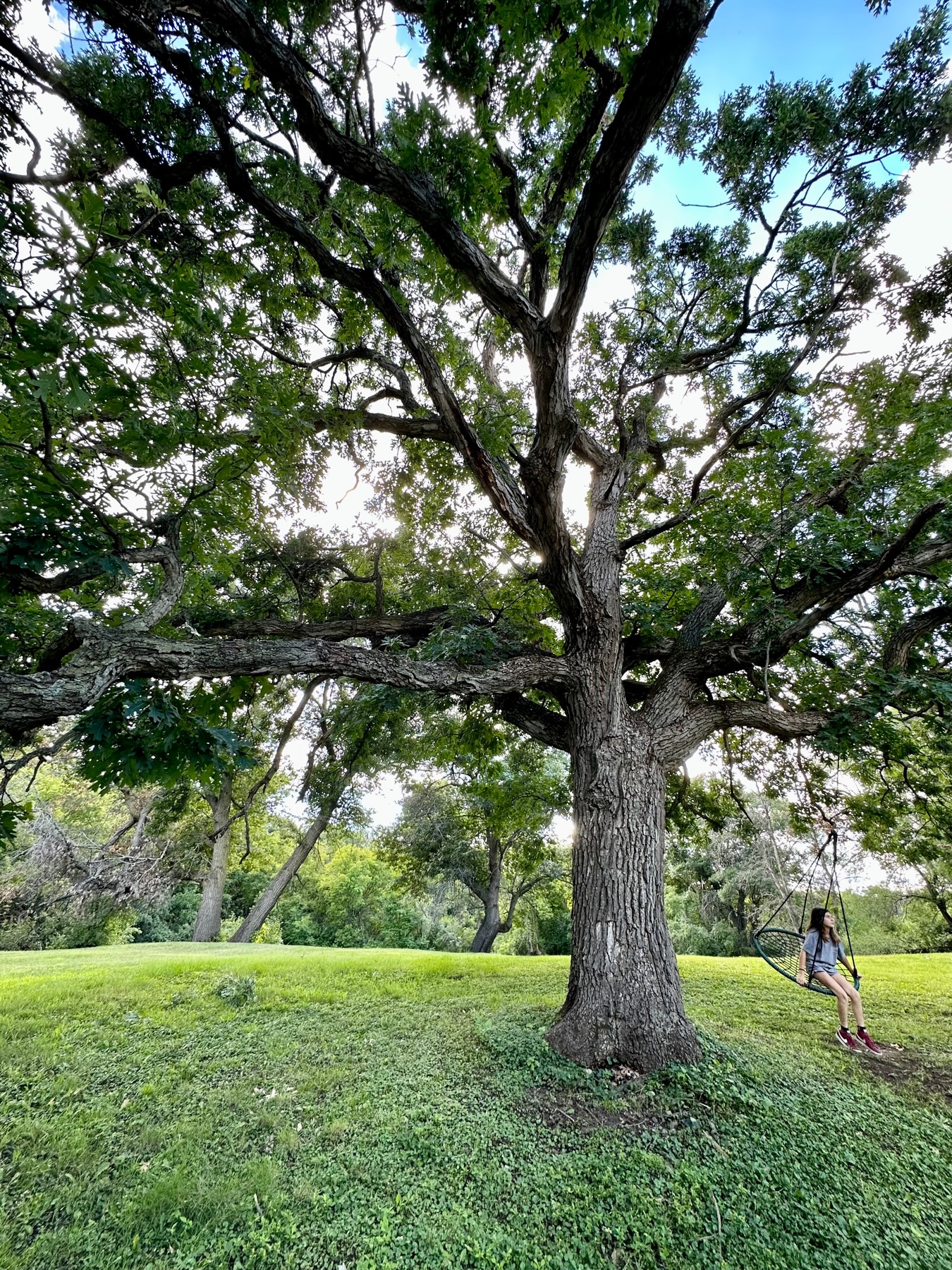
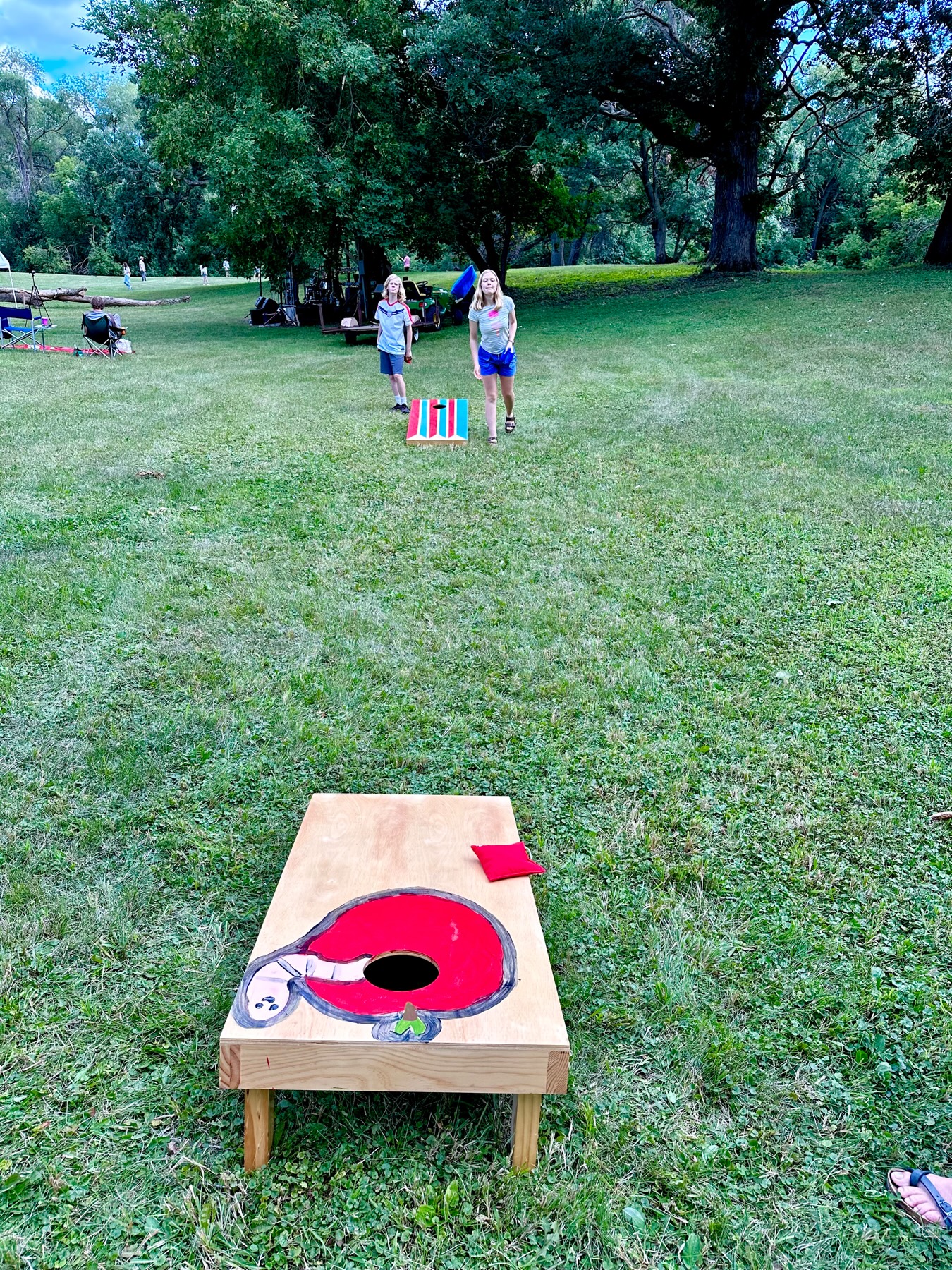
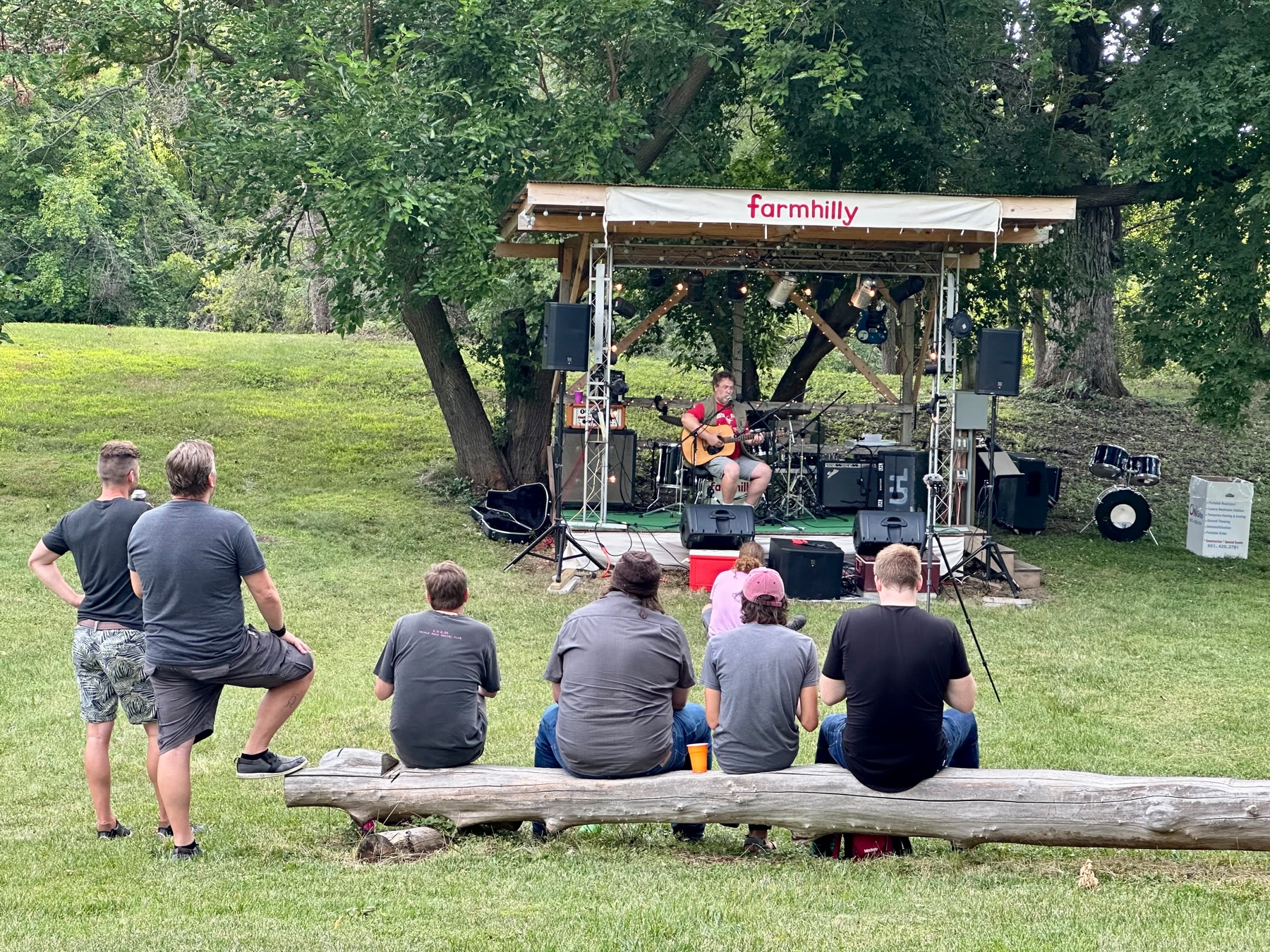
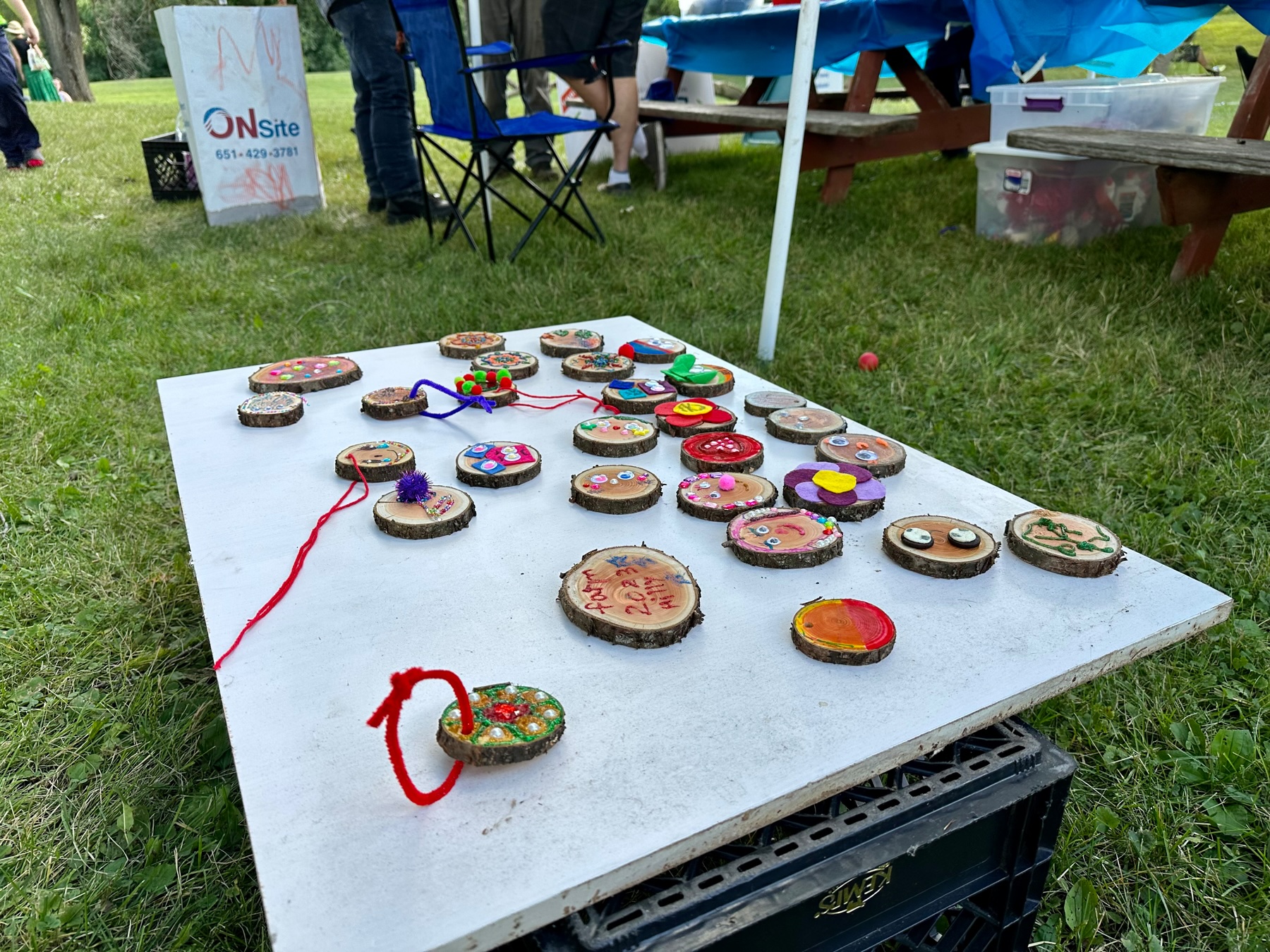
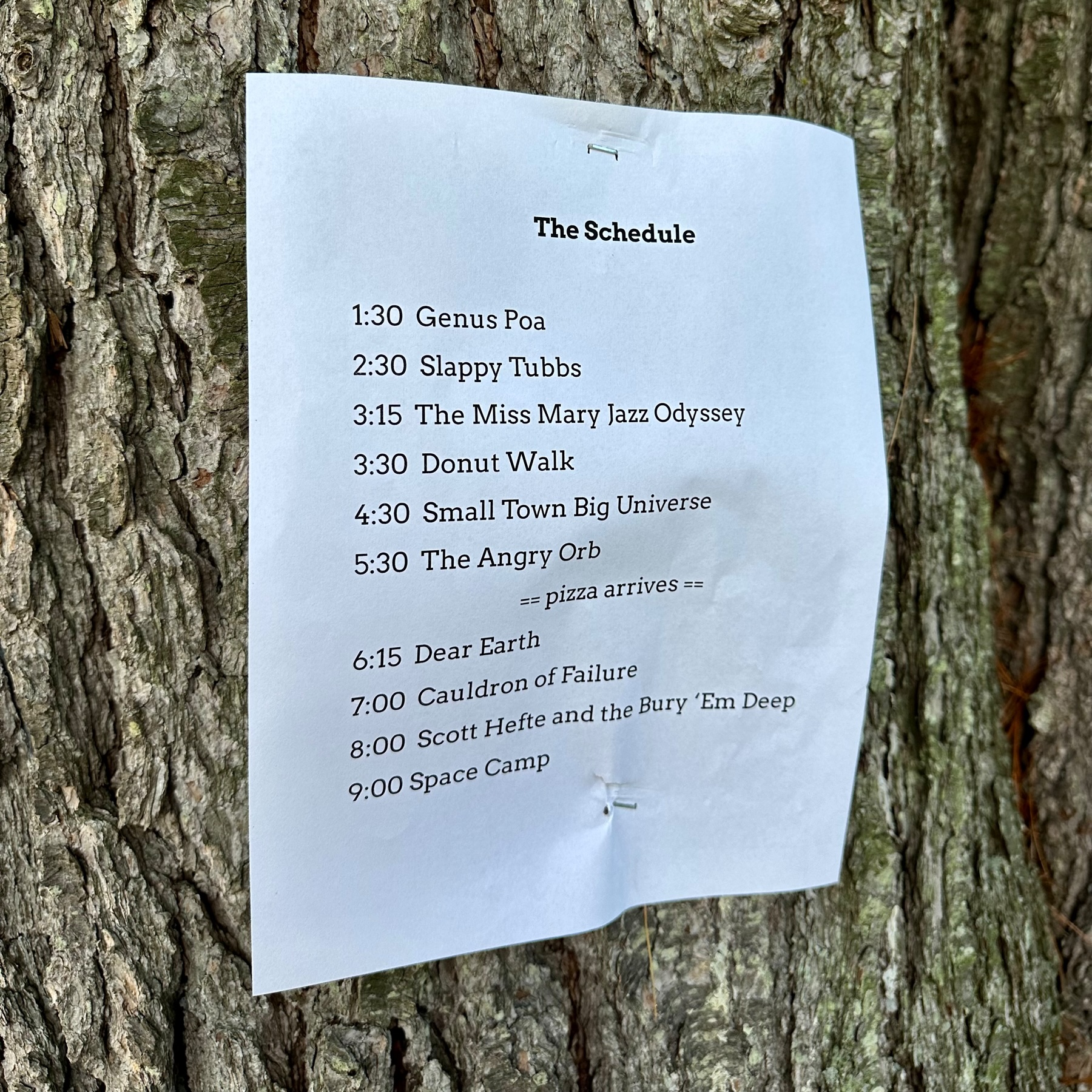
It was cool to see the Minnebar 17 POAPs highlighted in the April 25 issue of This Week in POAP!
Minnebar, America’s “largest and longest-running technology unconference” was held at Best Buy’s corporate headquarters in Minneapolis and dropped POAPs for attendees, presenters, and organizers, as well as a POAP during a session on creating digital community with POAP (LinkedIn post highlighting the POAPs).
I also really like how the POAP images turned out.

Hector and I at Minnebar 17! I’m sporting my Community Supporter tag, as well as my awesome POAP pin!
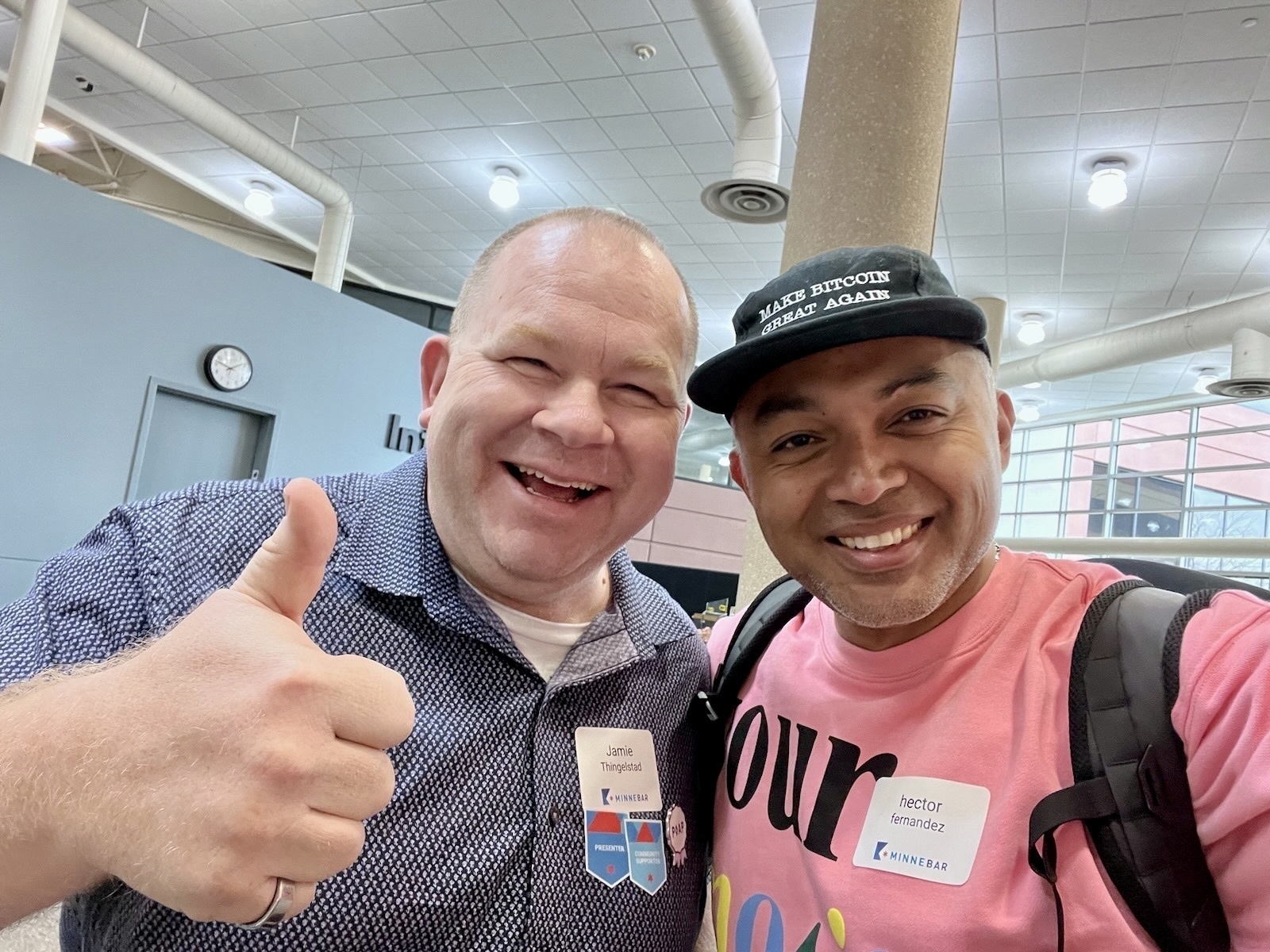
See also Minnebar collection.
Minnebar 17 StayNftyMpls 612 Series Giveaway
Minnebar 17 is coming up on April 22nd! For the first time ever, there will be Minnebar 17 POAPs given to all attendees, presenters, and organizers. I am excited to share that there will also be a free POAP Raffle in partnership with StayNftyMpls for everyone that collects any of the event POAPs.
StayNftyMpls is a supportive community that shares, celebrates, and encourages the creativity of our community by exploring and leveraging NFTs and blockchain technology. Erik Halaas started StayNftyMpls and launched the 612 Series (also on OpenSea) as its first collection.

The 612 Series highlights landmarks around the Twin Cities area — places that many of us have memories and stories to share about. This is a local project, with local landmarks, from a local artist!
This is all completely free and for fun! And there will be thirty-two winners!
The thirty-two 612 Series collectibles are currently in the raffle.Minnebar.eth wallet. The raffle will draw 32 winners at 4:45pm on Saturday, April 22nd. The winners will be given items from the 612 Series as follows:
Once the raffle is completed, each item will be transfered to the respective winners from raffle.Minnebar.eth within three days. No action is required.
Hosting Minnebar 17: Creating Digital Community with POAPs
I’m going to host a session at Minnebar 17 on Creating Digital Community with POAPs! It is my first time back to hosting sessions at Minnebar in several years, and I can’t wait to share all the fun you can have with POAPs in your projects and communities. If this is interesting, sign up on the Sessionizer and indicate that you might attend this!
Now that you’ve claimed your Minnebar 17 POAPs, let’s talk about how you can use POAP to build digital community for on your own!
On June 7, 2021 I claimed my very first POAP and was intrigued. I quickly developed a love of these digital tokens that allow me to collect and remember fun events. I’ve created over 40 different POAP events for hobbies, personal use, family events, and professional.
We will cover:
POAPs are an incredible asset to create digital communities, and there is a vibrant ecosystem built around them to enhance and add utility.
Hosting Minnebar 17: How to Newsletter
Update: Sorry to say that this session had to be cancelled. We had some travel plans come up and we will only be able to attend Minnebar 17 for half the day. We are still going to do the POAP session though.
I’m going to host a session at Minnebar 17 on How to Newsletter: Lessons from 250 Issues of The Weekly Thing. This is my first time presenting at Minnebar in several years. I’m excited to do it again!
If this is interesting to you, register on the Sessionizer and indicate that you might attend this session.
I have been publishing The Weekly Thing since May of 2017. With 250 issues of the newsletter complete I’m hosting this session to share the common questions that I get about:
Additionally I will be covering:
This session will be focused on the creator and building. We will not be covering marketing, social media, or anything related to newsletter monetization or subscriptions.
Minnebar 17 POAPs
I am excited to share that all attendees to Minnebar 17 will be getting a POAP token! In addition to the traditional t-shirt, there will be a unique claim code given to everyone so that they can claim a permanent collectible from the event. 🎉
What is a POAP? Technically it is an NFT that is issued as a collectible for an event or occasion. It is like a digital version of a sticker or shirt. I’ve collected over 80 of them, see my collection for some examples.
POAP is pronounced “poh-ap”.
Update: Also see the Minnebar 17 StayNftyMpls 612 Series Giveaway!
The POAPs
There will actually be three POAP tokens given at Minnebar 17. 🤩
Attendee: All attendees will be given a claim code when they check in on arrival. Everyone that attends will get one of these.
Presenter: All presenters that sign up via the Sessionizer will have a claim code sent to them.
Organizer: All organizers who help put the event on will have a claim code sent to them.
Any holder of these POAPs will also be eligible to enter into a raffle at no cost to win something special. Stay tuned for more information on that!
I also plan to have my personal You’ve met thingelstad.eth tokens ready for distribution. Ask me for one at the event. 😊
How to get ready?
If you want to get ready ahead of time so that you can claim these easily you can do two things.
First, you need an Ethereum wallet and address. If you don’t have one, I highly recommend using Rainbow on iOS or Android. It is a very well done wallet and is simple to setup and get started with. It is totally free.
Once you have an address you are ready to go, but if you want to make it even easier you can install the POAP App too. This is also available on iOS and Android. If you configure this with your wallet address you can automatically claim a POAP just by scanning a QR code or tapping an NFC device.
Questions
What is a POAP?
POAP stands for Proof of Attendance Protocol. The POAP website has a good explainer. Functionally they are ERC-721 tokens issued on the Gnosis blockchain. The smart contracts for POAPs have a number of additional applications built around them to add additional utility.
How much does this cost?
Nothing. No funds or crypto are required to collect as many POAPs as you want. All gas fees for minting the POAPs are covered by POAP.
What is the environmental impact?
POAPs are issued on the Gnosis blockchain which uses a proof-of-stake validator mechanism similar to modern Ethereum. As such, it uses minimal power.
Can I sell the POAP?
POAPs are meant to collect and curate memories, not make money. It is strongly discouraged to sell a POAP, but technically you can. As an ERC-721 NFT you can send POAPs from one wallet to another on Gnosis chain. You can also migrate the POAP to Ethereum mainnet, however there is a 0.1 ETH fee for doing that which is largely intended to keep people from attempting to sell them.
Why do some POAP owners have names?
POAPs are held by wallets, and if you buy and configure an Ethereum Name Service name the wallet address can be displayed as a name. If you would like to do this, go to the ENS app and buy your preferred name, remember to set the reverse address lookup, and your name will be shown instead of an address.
If you have other questions, check out the POAP Help Center.
Extending the Minnestar Community Supporter Program
In a recent conversation with Minnestar Executive Director Maria Boland Ploessl I was very pleased to hear about the amazing growth of the Minnestar Community Supporter program. Community Supporters were something that we launched when I was on the board of Minnestar to create an opportunity for individuals to support Minnebar and Minnedemo, in addition to companies. It was always significant, even on the first year, but it has grown a lot in recent years. The biggest part of that growth has been the structured year-end giving program which I was happy to be a matching supporter of this year.
The growth is awesome, but the program itself hasn’t changed materially since the launch. The primary benefit of being a Community Supporter is that you are guaranteed a ticket to the highly in-demand events that Minnestar hosts. That is a great benefit, but I’ve always wondered what more could be done for this great group of people that are helping support our technology community. Particularly what could be done outside of events.
In my opinion, being a Community Supporter of Minnestar should be table stakes for any technology leader in the region. It should be the most direct way to give back to the technology community we are all part of, and provide meaningful value to the supporter individually. I think supporting the events and community is solid, but the only meaningful value to the individual is a guaranteed ticket.
So what more could be done to grow the program? Some ideas…
Create Connection
People that become Community Supporters are a pretty special and fun group. Creating more connection in that group could be incredibly valuable. This could be done with in two phases.
First, launch an every-other week newsletter just for Community Supporters. This newsletter could include:
The newsletter could be the whole thing, but if there is an increase in engagement a forum for Community Supporters could get traction. I specifically do not mean Slack or Discord. Those are far too high engagement. A platform like Discourse seems much better suited to this. I think Minnestar could benefit from a Discourse like platform for everything, with Community Supporters being a member only section.
Membership
There needs to be more ways to show a persons affiliation with Minnestar, and recognize that support. I’ve been a Minnesota Public Radio member since 1995. How do I know that? My member card says it. I’ve been an Electronic Frontier Foundation member since 2010. It’s on my member card.
First step of this should be to issue an actual Minnestar Community Supporter member card. Cards have to be printed, they expire, etc. There is effort to do this but it gives me something to carry with me and show my membership.
This should also be extended into the digital world with POAP tokens. There should be a POAP for each year given to community supporters. Over the years, you collect each yearly POAP.
This would also be an opportunity to highlight the work of a local artist and create a uniquely designed card and token each year that isn’t just membership, but something that people feel like collecting.
I’ve been a Community Supporter member since the program started, but I have no idea how long that has been!
Input & Direction
Community Supporters as a group could be given the opportunity to have input on Minnestar activities. As a group votes could be taken. Thought would have to be given on what the votes are on. There is a Minnestar Board and various committees, and they should continue to do what they do. But there could be decisions that the community supporters are asked to give a vote on.
I had long thought that it would be really great for one of the Minnestar board seats to be a Community Supporter seat. In this case, the Community Supporters would elect amongst themselves one member that would represent them on the board. This could be facilitated via the forum above, with members raising their hands to serve and make their case followed by an official voting period.
This would lend itself exceptionally well to a Minnestar DAO, with membership gated via the Community Supporter POAP that you receive each year.
Ecosystem Benefits
It would be interesting to explore ways that other organizations in the technology community may want to extend benefit to Community Supporters of Minnestar. This is one of the key reasons to create Membership with a card and a token. Perhaps Twin Cities Startup Week would offer some unique opportunity. Or Tech.MN give a discount on membership. Or early access to certain events.
This would require that Minnestar reach out to have conversations around this with other events, and require proof of being a Community Supporter without access to Minnestar resources. I think this could work, and may be welcome from other organizations as well.
I reserved three Ethereum Name Service (ENS) names for Minnestar: minnestar.eth, minnebar.eth, and minnedemo.eth. Minnestar doesn’t have a need for them today, but I think they will in the future. I’ll have them over in my thingelstad.eth ENS collection in the meantime. 🤓
Minnedemo 37
It was great to see the Twin Cities technology community back together for Minnedemo tonight at the Reverview Theater. Minnedemo was also part of the Twin Cities Startup Week lineup.
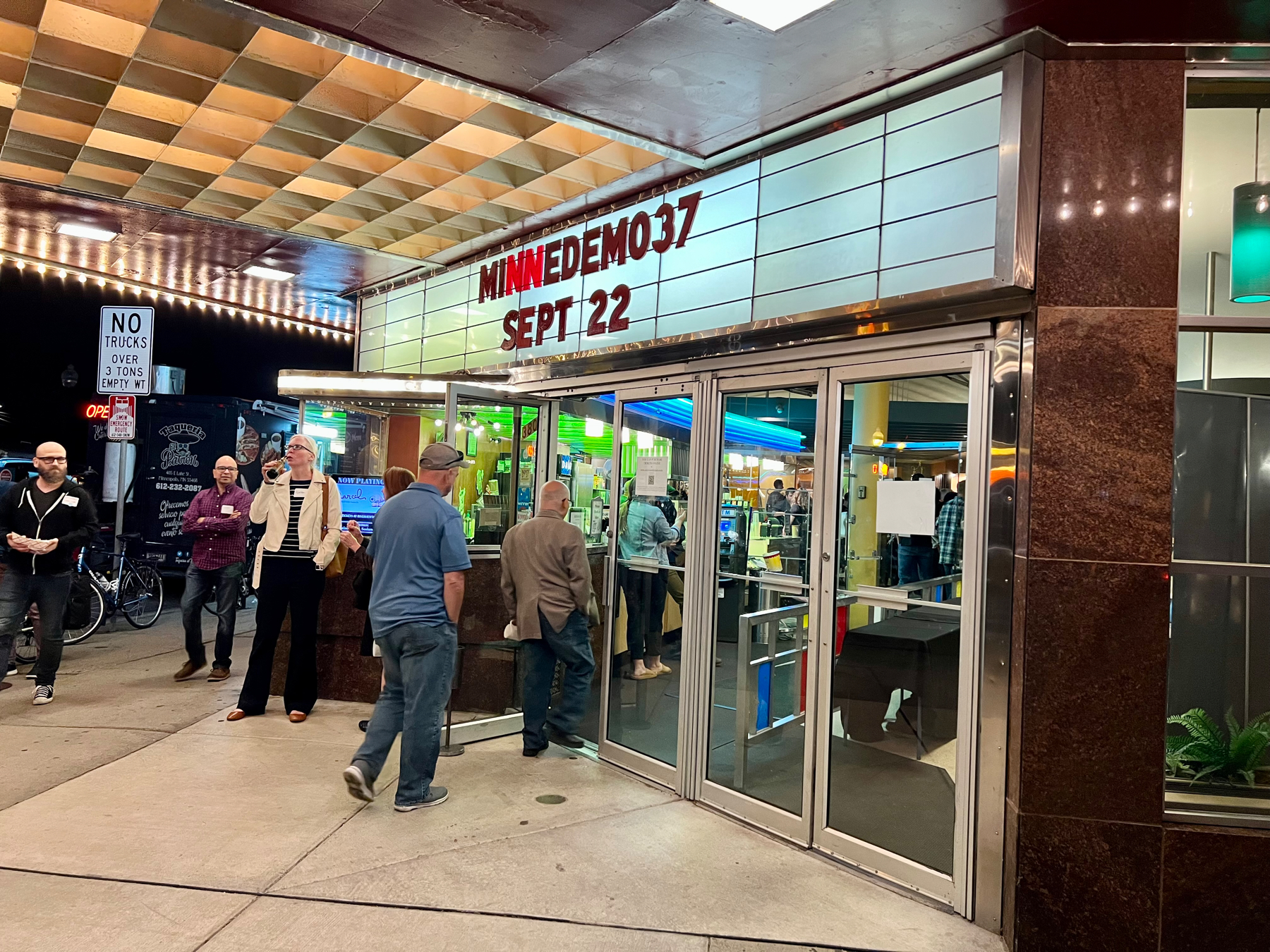
The presenters for tonight were great. I also have a special affinity for the vibe of the Riverview Minnedemos. Theatre snacks, food trucks, and a gorgeous evening are a pretty awesome combination.
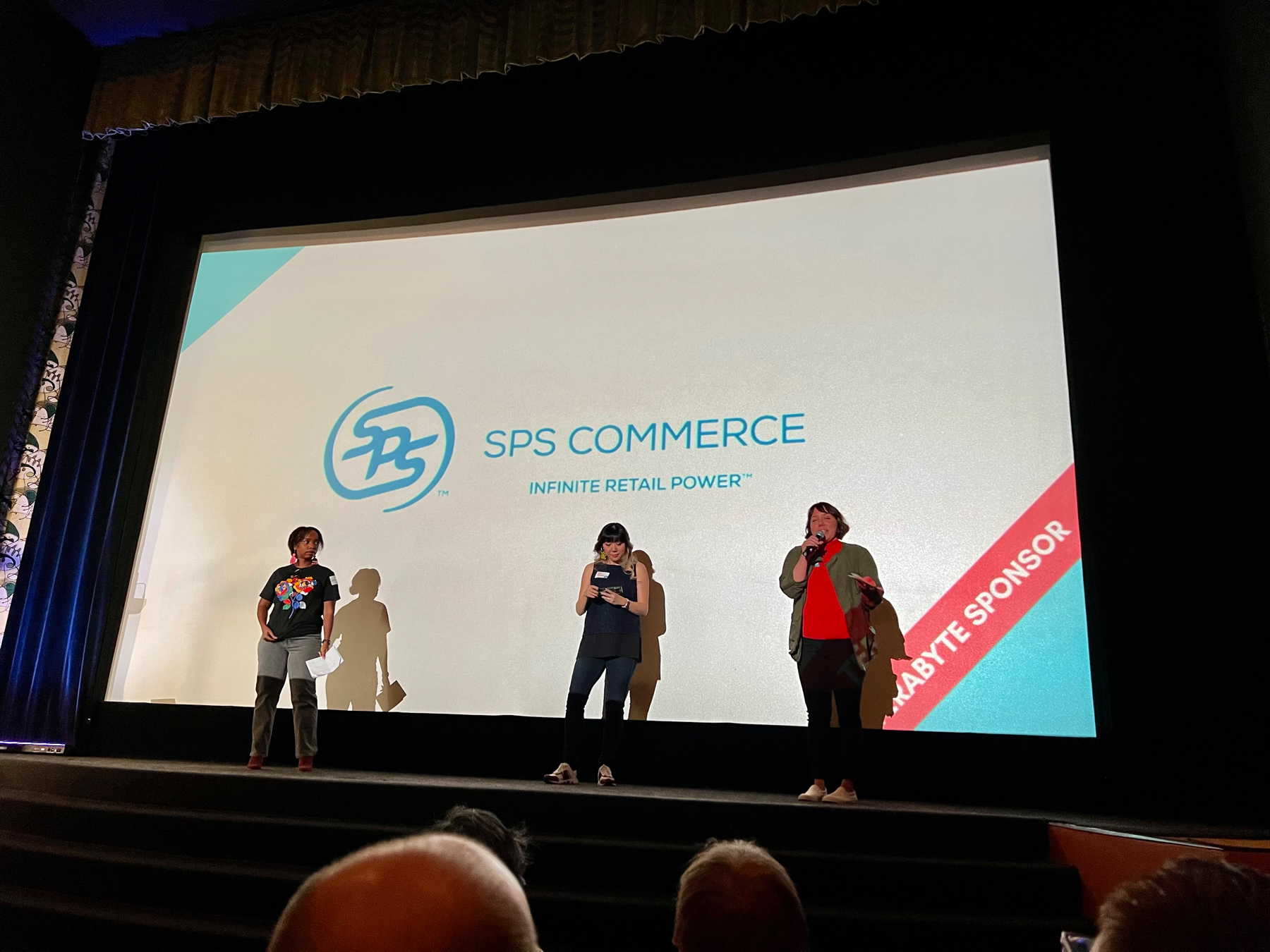
The demos were really impressive!
Sunsett.io: Well designed and easy-to-use product to merge reporting information from many platforms into a single view for small- to mid-sized companies.
Teqnizan Bluetooth Earrings: Cool idea of an earbud that is mounted into an earring and works outside of the ear canal.
Collab Spot: Allows you to overlay a collaboration layer on top of any website allowing people to build a website to work together in the actual site.
IntelligentRx: Mind boggling free tool that allows you to find discounts and coupons to apply to medications and save as much as 90% off the retail price. Incredibly impressive. Self-funded and growing.
Seraph7 Studios: Presenter had to cancel. 🙁 Guessing Covid.
Aurelius 3.0: Solution that collects end-user feedback, does speech-to-text analysis, and allows you to curate and analyze aggregate feedback.
SitEat: Service specifically designed to allow concession operators at sports venues to allow fans to order from their seat and get orders fulfilled much faster.
I thought IntelligentRx had the most promise to be very impactful for people. SitEat is something I would love to use at MN United games.
Even after 37 sessions, 259 demos, I’m still amazed at the creativity and ingenuity of the technology community here.
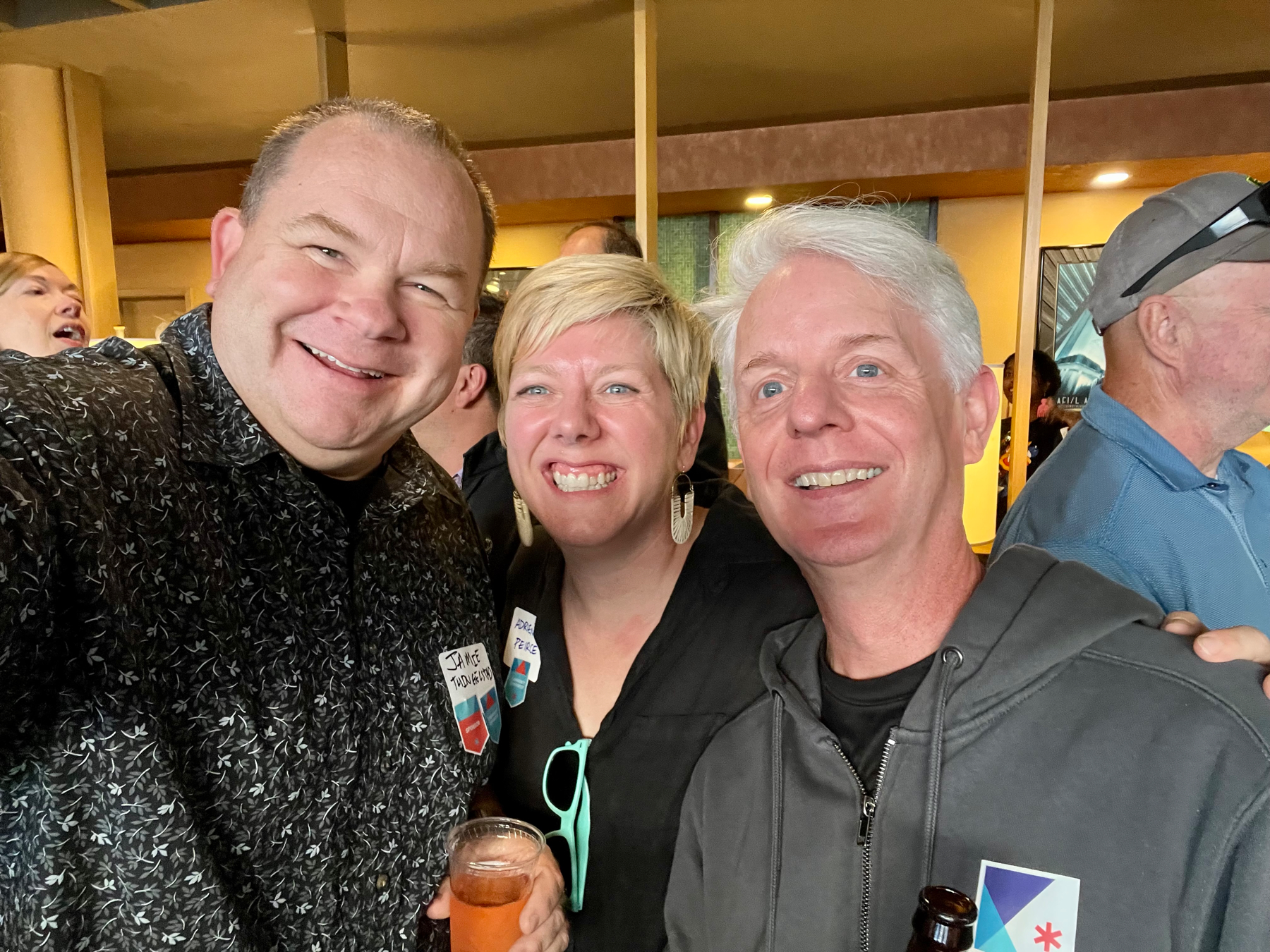
Former Minnestar Board members: Me, Adrienne Peirce, and Jim Bernard.
Remembering Matthew Dornquast
I first met Matthew when he was CTO at Fallon. It must have been 1997. I don’t remember how we got introduced to each other. We both went to the University of Minnesota in Computer Science but Matthew was a few years ahead of me and we didn’t overlap there. I do remember meeting Matthew though. We were building BigCharts and Matthew and I immediately connected on our shared passion for technology and specifically the Internet and the rapidly evolving web. Matthew was very smart, passionate, focused. I remember him talking about moving on and doing something new, the thing that eventually became Code42. Not before I tried to persuade him to join our ragtag band at BigCharts. But it was very clear that he wanted to pursue something on his own.
We stayed in touch over the years and would regularly meetup to chat technology, the Internet, startups, etc. He returned my favor of gently trying to bring him into BigCharts when we had lunch downtown and he gauged my interest in joining them as they started to build out CrashPlan. I was an early user of the peer-to-peer version of CrashPlan and used it to for a neighbor and I to be each others offsite backup. As always, Matthew was passionate, excited, driven and always focused on the technology.
Matthew and I would regularly connect around our shared passions and joint focus on doing everything we could to make the Twin Cities technology community stronger. Matthew was always a dedicated supporter of Minnebar and Minnedemo. He cared deeply about the technology community around him, and always showed up to support and grow the talent around him. I will forever miss that about him.
Matthew and I never did get to do a project together. I have an incredible amount of respect for what he built. Through the consulting business of Code42 they bootstrapped a product that became the largest Series A investment in Minnesota history. In the middle Matthew made several bets in early stage companies by building the technology in return for some equity.
Unfortunately it has been a few years since we connected. After Matthew moved on from Code42 and moved to New York we didn’t have those serendipitous moments to connect. But by his tweets you can see that his passion for technology was present through all of his life. It is sad to see a mind as bright as his go so early in life.
Thank you Matthew for all you did for the technology community, and for building so many things that continue to provide value today. You will be missed.
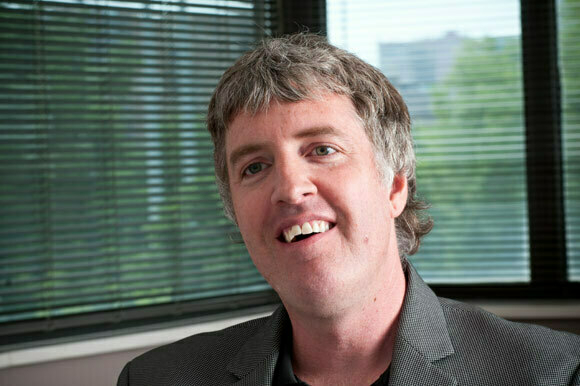
Related
Things 4 Good on Endaoment
I had been thinking it would be really cool if Donor Advised Funds (DAF) were open to accepting crypto tokens as deposits. There has been a lot of wealth built up in crypto and it would be very beneficial to create simple means to move some portion of that to non-profit organizations. Shortly after this I stumbled upon Endaoment.
Endaoment describes itself as “We’re a tax-exempt Community Foundation built for decentralized finance and focused on social impact.” Endaoment is a DeFi version of a DAF like Schwab Charitable. This morning, while Ethereum gas prices were predictably low, I sat down to play with this first hand.
Setting up your Fund
I went to Endaoment and connected to my wallet. Easy enough, just like any other Web3 application. I then created my own fund. This was super simple. I needed a name, I chose Things 4 Good. Gave it a tagline. I then associated my name and address. There were no credit checks, no social security numbers, just basic contact information. After this I submitted a transaction that deployed the smart contract for my DAF.
Now I had my own contract associated with Things 4 Good, and it was time to provide an initial deposit to the fund. Endaoment requires a minimum $500 transfer so I sent in 0.15 ETH. When Endaoment receives the ETH they immediately transfer that to USD Coin (USDC). They sent me a receipt for tax purposes for the full value of the 0.15 ETH. Endaoment takes a 0.5% transaction fee, and there are some fees associated with the transactions to USDC, which are taken out after.
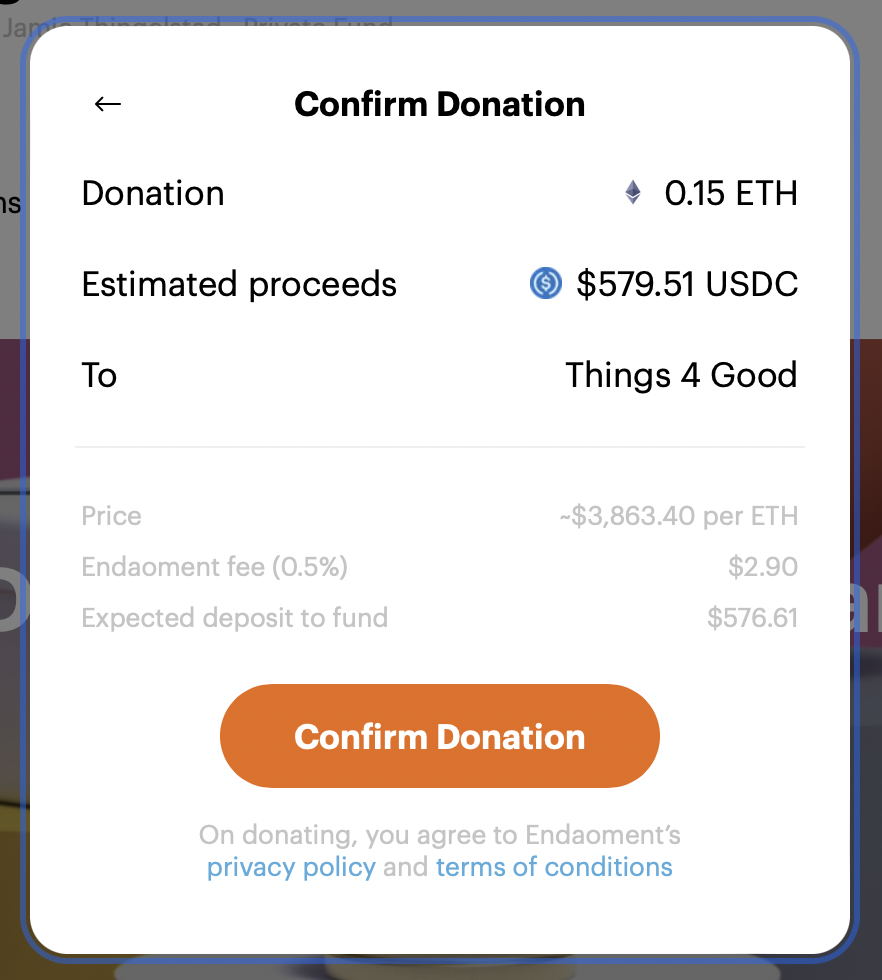
With that done, my DAF was fully established on the Ethereum mainnet, funded, and ready to use.
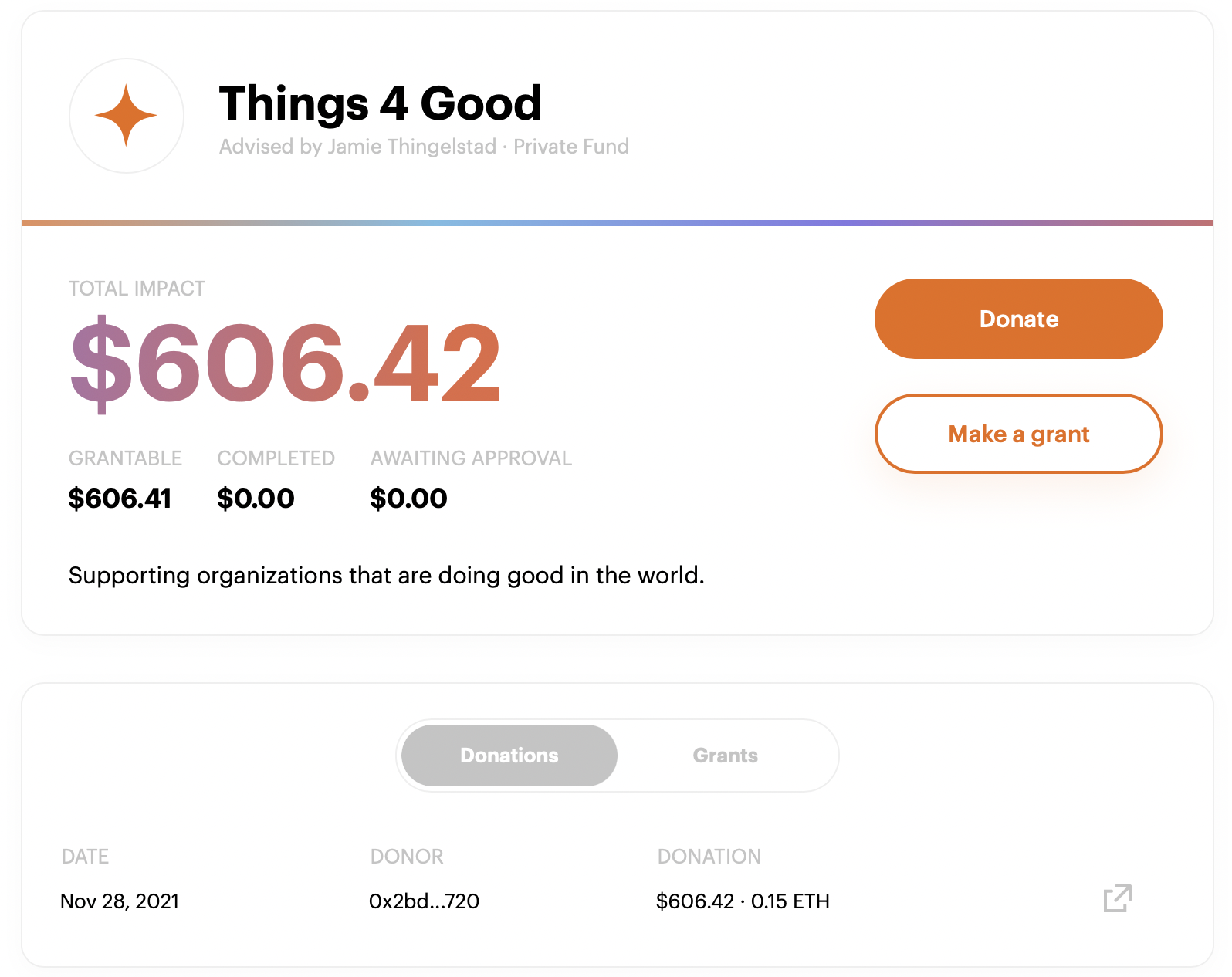
Granting Funds
Now that Things 4 Good was setup I wanted to try issuing a grant. The Internet Archive is an organization I have supported for a long time and I thought it would be a fitting organization to make a first donation to. I picked them off the list of organizations registered on Endaoment. This was fun to me, because this is also on-chain, so to send the grant you interact with the smart contract.
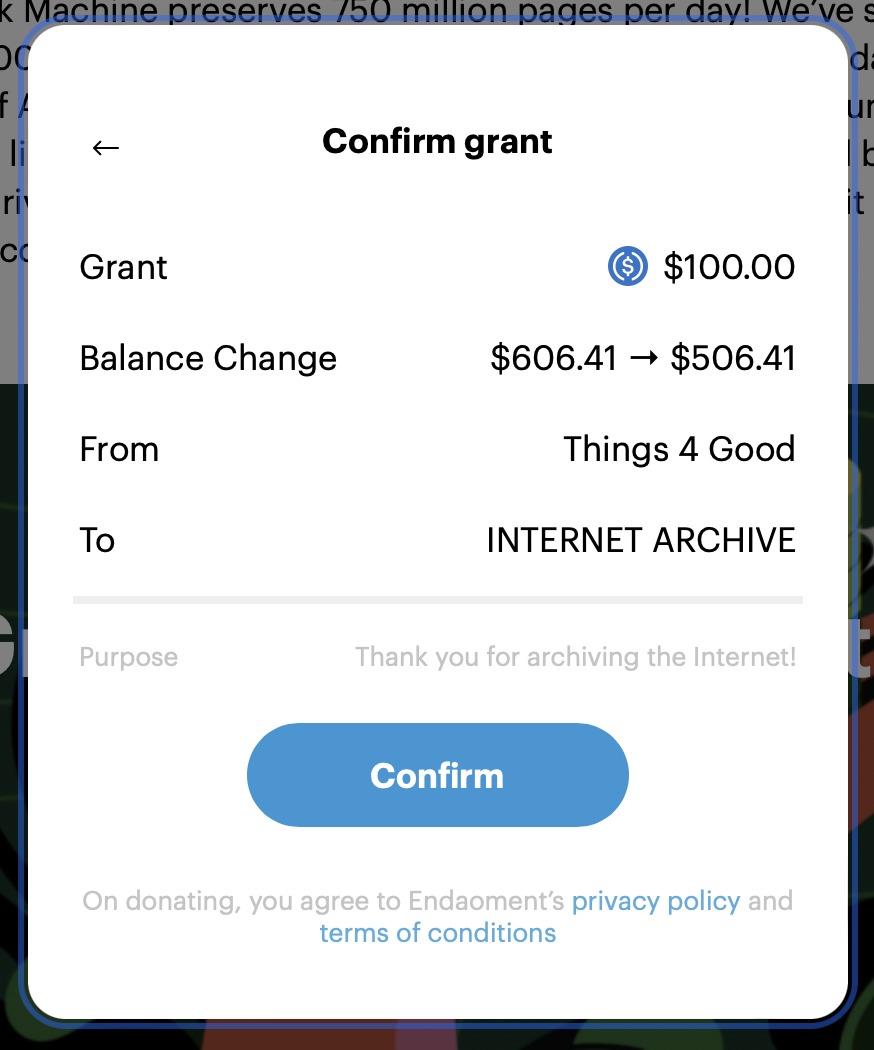
I appreciated this as it felt like a much different level of control than a typical DAF. We use Schwab Charitable and you make recommendations, they send checks, and you get emails saying it all happened but you can’t actually see it yourself. With Endaoment I can see my transaction and know exactly what happened when.
With very little effort I have my DAF setup on the Ethereum mainnet, funded, and already distributed a grant. This is holy crap amazing. 🤯
This seems like a powerful and needed capability as you manage your crypto assets. Plus it is an incredible example of the power of DeFi applications built on Web3 technology.
Deploying Organizations
After chatting with some of the Endaoment team on Discord they showed how you can deploy any existing 501(c)(3) organization. Any user can fund the deployment of the smart contract for that group. So I went ahead and deployed Constellation Fund and Minnestar on Endaoment.
Techies who Peloton First Ride
When Minnestar decided to launch these “Techies who …” communities I was really excited to get a Peloton group setup! As if by design, Peloton also just launched their brand new scheduled session feature that works perfect for this. So we are getting our very first ride scheduled, and I thought it would be fun to do it on St. Patrick’s day!
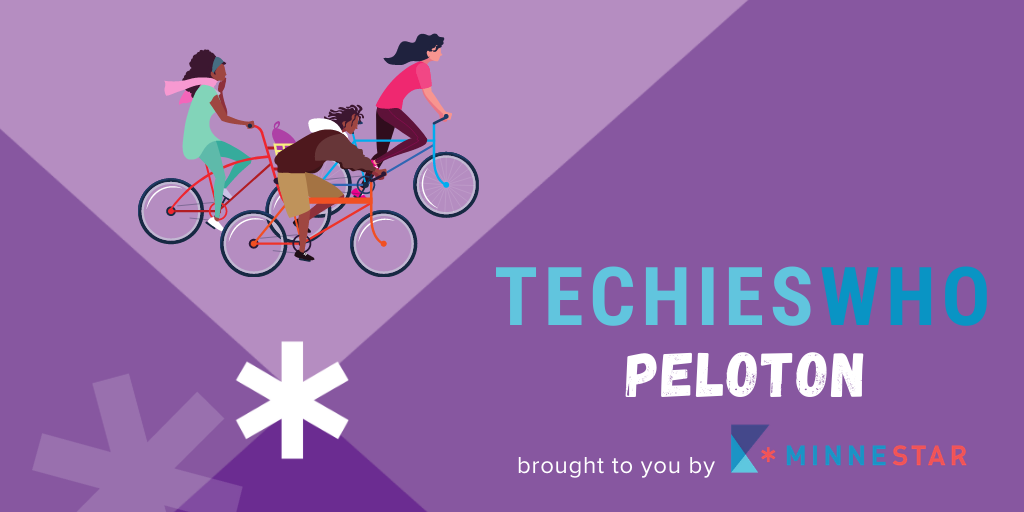
If you are a Peloton Cyclist join our first Techies Who Peloton ride! 🚴
The Importance, Accessibility, and Inclusivity of Connecting Online
We have all shifted quickly to online platforms for many of our interactions. It is easy to see some of the challenges with this. Technical barriers. Cognitive confusion leading to “zoom fatigue”. There are also some powerful benefits online that were not as obvious before.
Work
For “knowledge workers,” most everyone is doing their work distributed, and I have noticed an equalizing aspect to it. The two dimensions that I see the most are geography differences being lessened, and more balance between those that are outgoing versus more introverted. When everyone you work with is in an equally sized video frame right in front of you, geography is only notable to the extent that it may be evening where they are and morning for you. I’ve had many team members share with me that they have never felt more connected with the members of our various offices. And perhaps more powerfully, our team members in other offices have felt like they can contribute and engage better with the rest of the teams.
This reinforces one of my beliefs about remote versus centralized teams that it is hardest to do both. Fully remote is a considerable leveler, and everyone will have to accommodate. Entirely local is the default that humans have used for millennia. The tricky part is doing both. My hope is that we can take the learnings developed during this pandemic and apply it to improvements and empathy going forward to keep these benefits in place.
Large group gatherings have also surprised me online. They work very well, as long as you keep the time short. And one of my favorite parts is that you can successfully engage in Q&A with the audience. I’ve held team all-hands meetings for decades, and I long ago decided to not open up time for Q&A because the chances of someone asking a question were near nil. The social dynamics of being that one person in a room of 250 that stands up with a question are just too challenging for most individuals to navigate. Online tools though by necessity must create a feature to do this. They have to enable it. And in doing so, they remove the barriers that inhibit people. I’ve found much more engagement than I’ve ever seen in in-person large group meetings.
mini minnebar
Last weekend was supposed to be the annual Minnebar unconference. Minnebar is one of my favorite events of the year. Over 1,000 technologists, collecting around community-led topics with about 70 sessions throughout the day. Minnestar, the non-profit behind the Minnebar, pivoted online and held mini Minnebar and I thought it was great!
The event was hosted on Crowdcast, and it was impressive. The event had a single track, versus multiple parallel sessions as it usually has. That was just fine to me, and it made me think that there could be five or six events like this throughout the year and get the same quantity of content to an even broader audience.
However, the big win to me was opening the event to a broader geography. One of the sessions I realized my brother would like. He lives three hours away and would usually never be able to attend Minnebar. But since it was online, I sent him the link, and he was on in 5 minutes. The event drew people from around the state. Minnestar has debated for years about how to reach people outside of the metro area. I know from dozens of board conversations. We considered for years bringing our events to other cities, but getting them online and opening up globally brought the program there. There was even a person from Turkey who attended Minnebar!
I also felt a lot of energy from the event. It hit me how important it was that the event happen, in some form. I needed the connection to the technology community to still be there. It was so great to see comments in the stream from friends and give a 👋 to them. It filled my day with energy to connect and so what if we couldn’t do it in person with happy hour, we still did it. It reminded me how vital these connections are, and we all must forge ahead.
A New Way to Mourn
My last observation on this topic is from an episode of the Daily called A New Way to Mourn. I highly recommend listening to this. It is a touching story with a powerful message. In short, this highlights that many funerals are being queued into the future. “We will get together to remember Bob when we can connect as a community.” There is a massive problem with this. These are essential rituals and are vital to loved ones and friends going through the mourning process. Deferring them to some unknown future date is going to cause significant problems.
This story about mourning and celebrating a departed loved one online is incredible. And again, I note the accessibility component. Some people can’t travel for various reasons and may be unable to attend a traditional funeral ceremony. Typically they would be excluded from this critical aspect of the mourning process. Hosting a visitation and funeral over Zoom opens up new avenues and accessibility for loved ones to be part of the process.
(mini) Minnebar
Attending (mini) Minnebar this morning, the very first online Minnebar! It is awesome to see minnestar pivoting to further its mission during the Covid-19 pandemic. 👏
Dan Lew’s opening session on “What Tech Can Do About Climate Change” was a great way to get started.
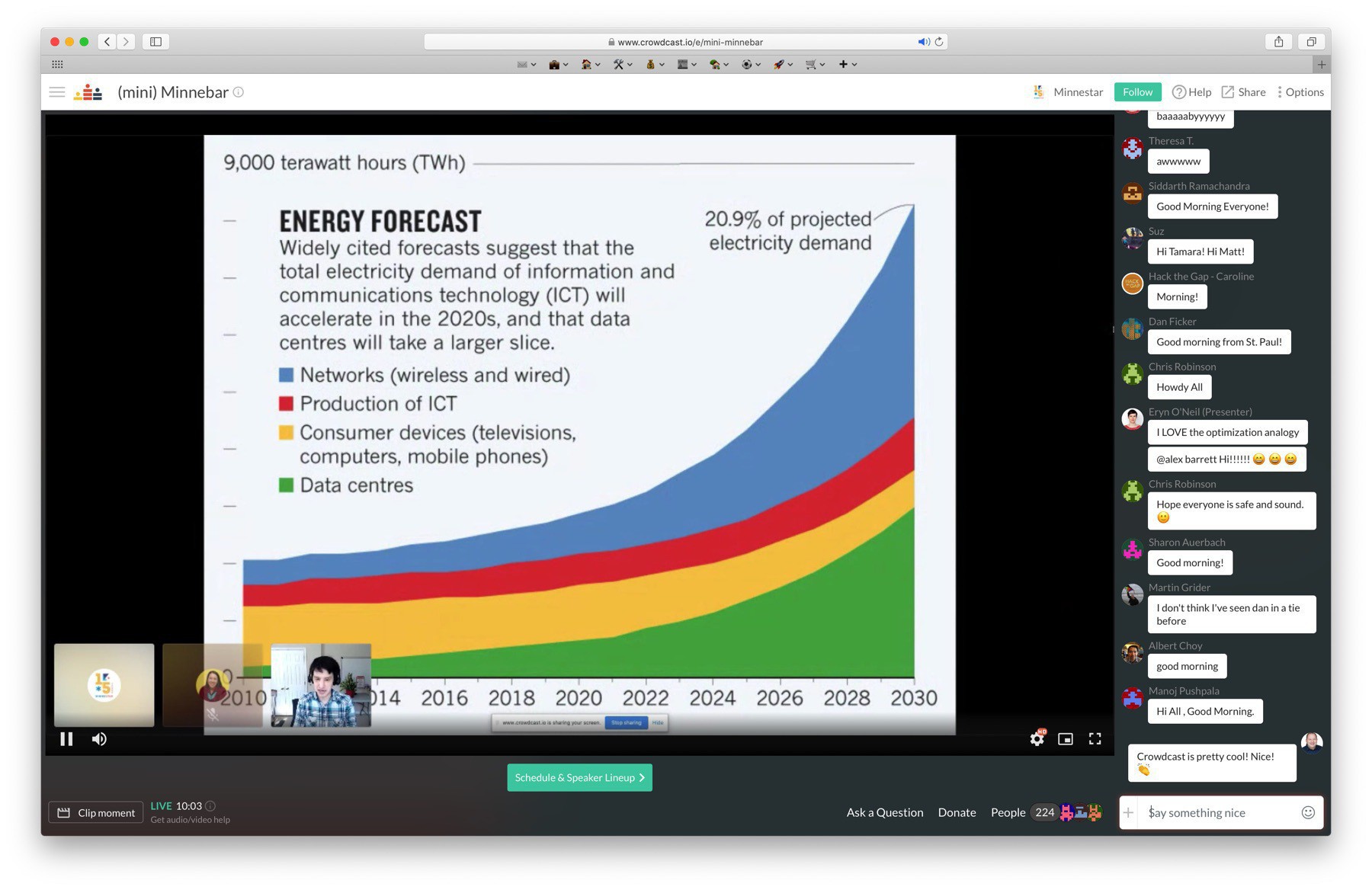
Of course very proud that SPS Commerce is a terabyte supporter! 💙
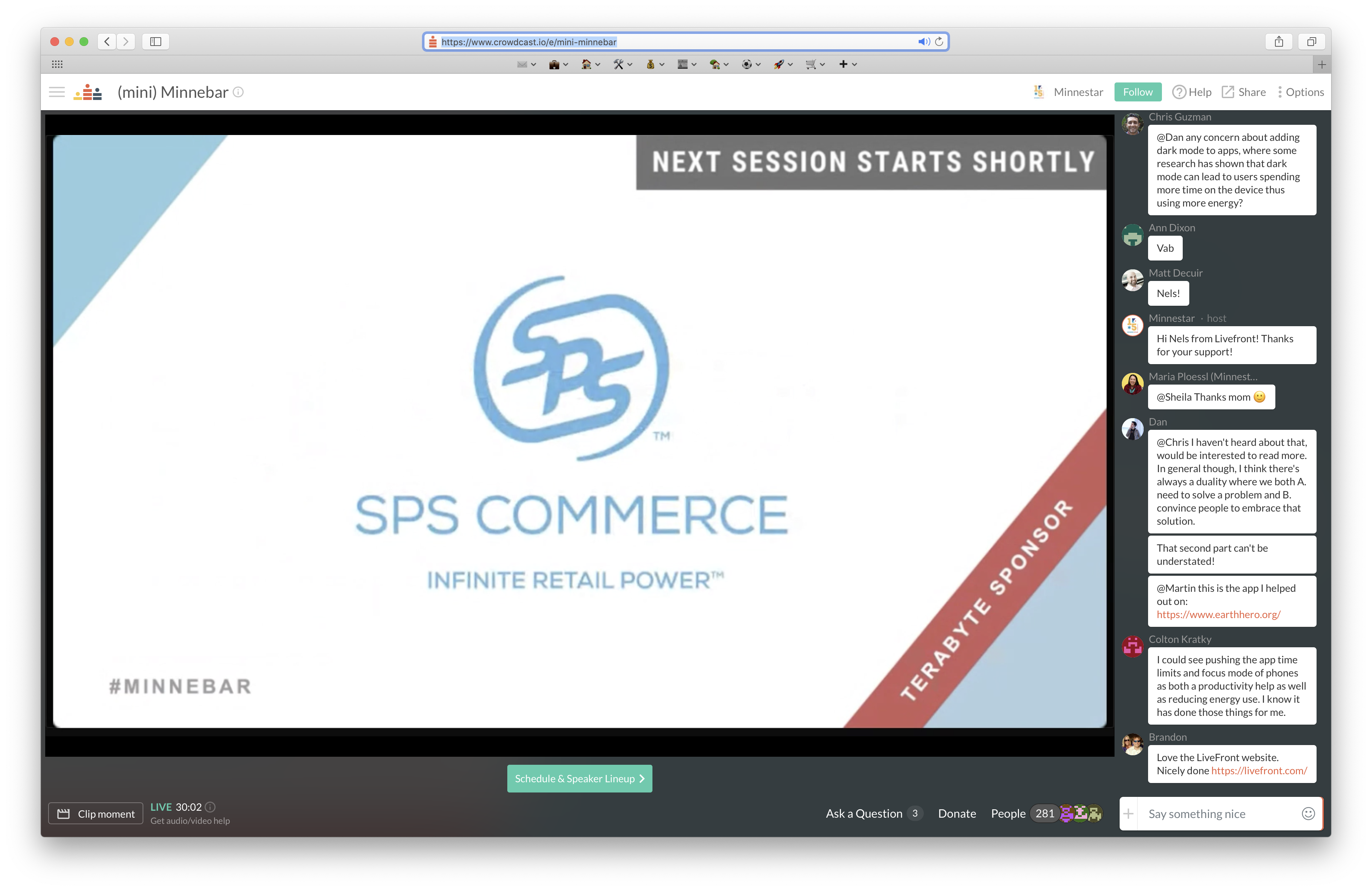
This is my first time using Crowdcast and the experience is very good. 👏
Joe Karlsson with “An Introduction To IoT (Internet of Toilets 🚽); Or How I Built an IoT Kitty Litter Box Using JavaScript”. Fun to see the interesting projects he’s doing. Predicts we will see this continuing to grow. For sure! 👍
Having Minnebar online is an interesting tradeoff. Something I could never do that I just did, was send the link to a number of friends, none in the Twin Cities, and suggest they sign on. There is a big inclusivity win with events moving online. 🤔
Kisha Delain with “Pair programming: Supporting Your Jr Devs Right”. It is so great to see #TeamSPS presenting at Minnebar! Kisha brought some great observations on what works to make pairing work well, which is one of the most critical ways that developers learn. 💻
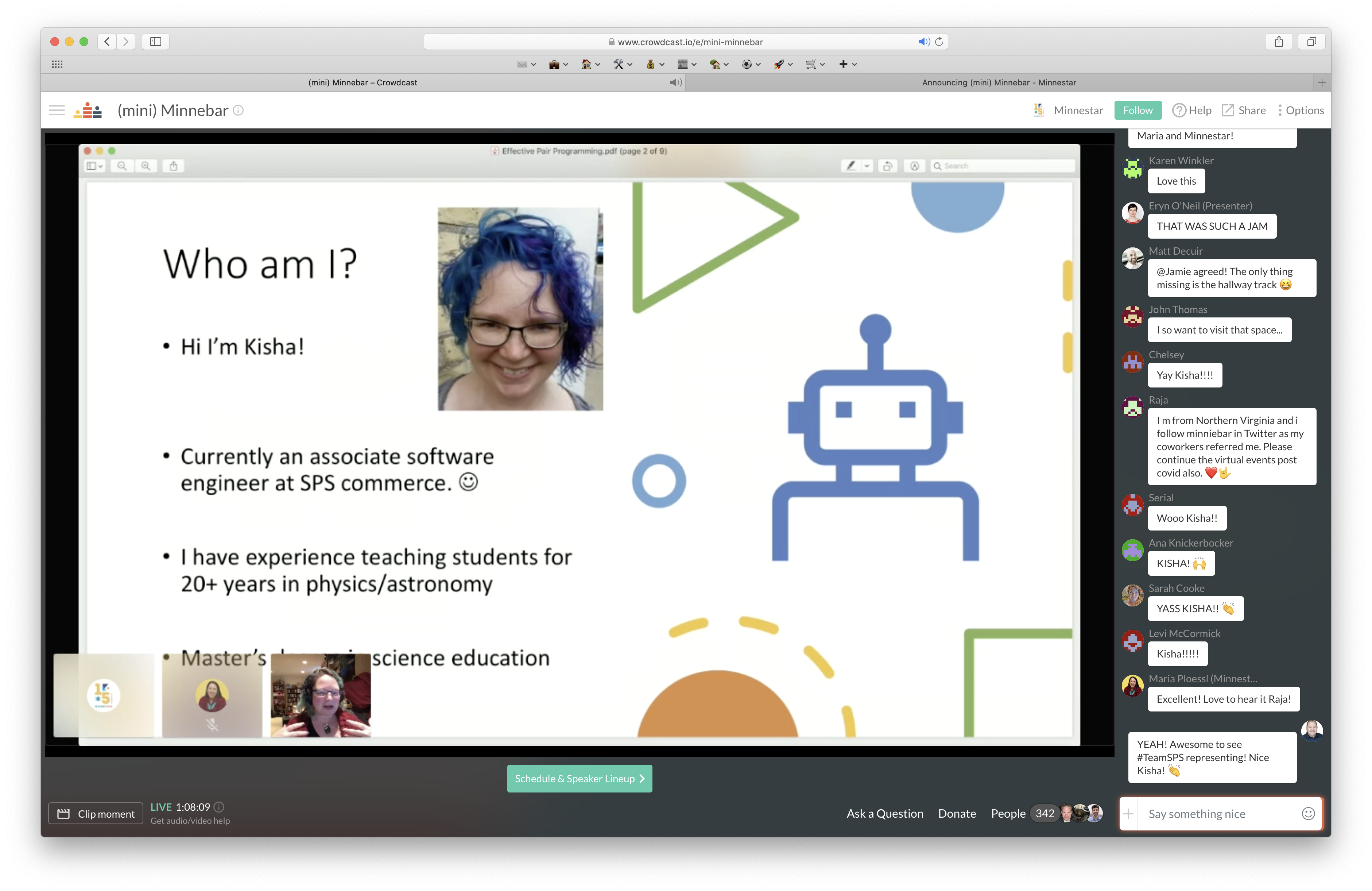
It is interesting to me that online events tend to have a structured method for facilitating Q&A from the audience. This is one of the things that seems to work way better in online events. Asking questions in an auditorium with 500 people is almost always a bust.
… due to other commitments I had to cut out after the first three talks. I really enjoyed this Minnebar and can’t wait to see the next iterations of events from minnestar like this! They even made the playlist available if you dug the tunes! 🎶
See also Minnebar collection.